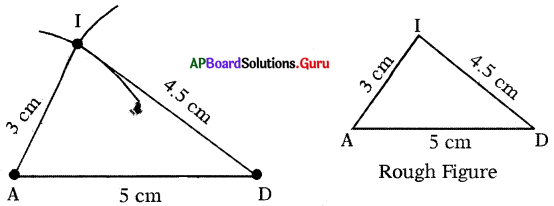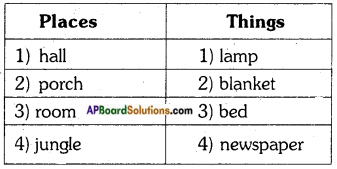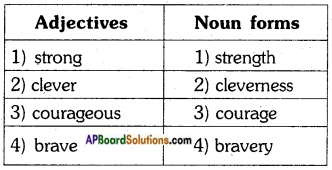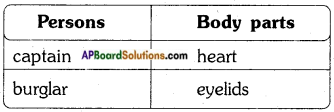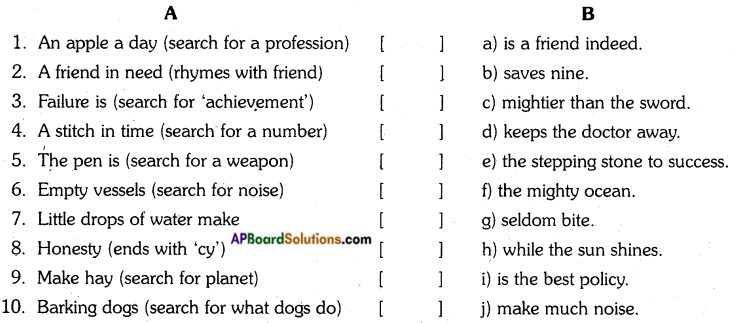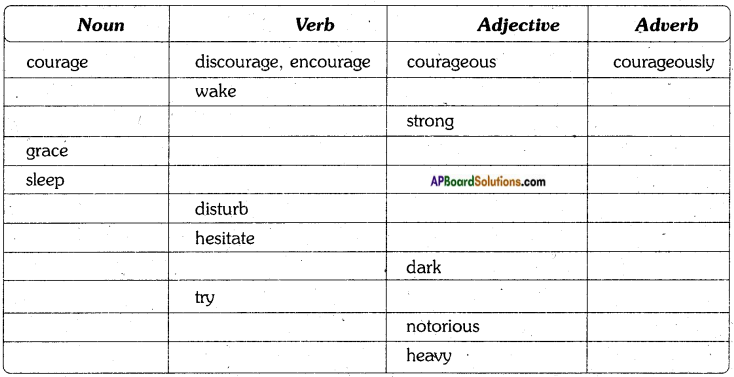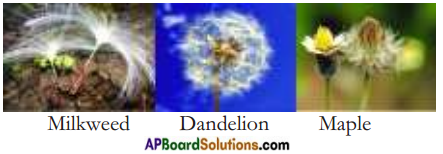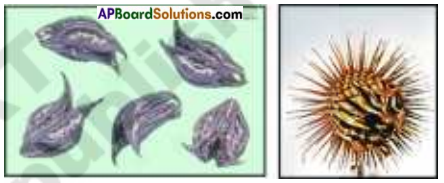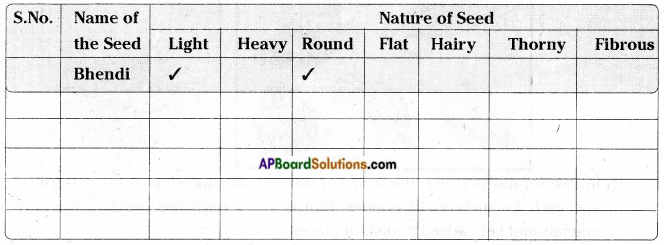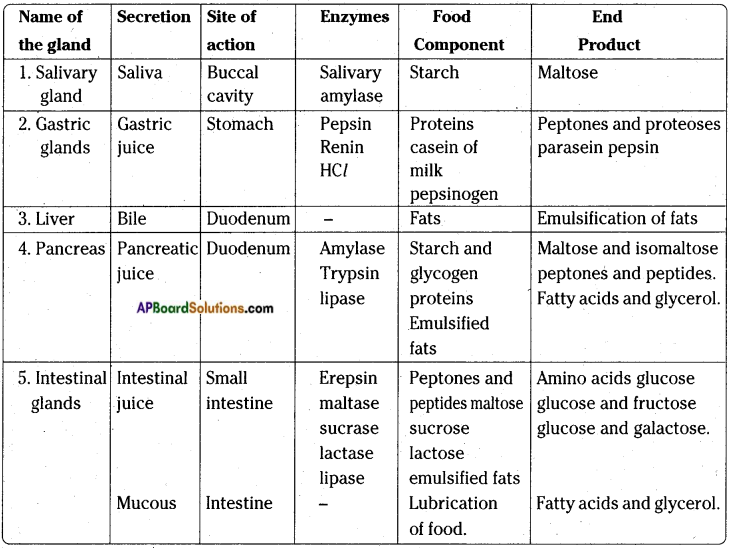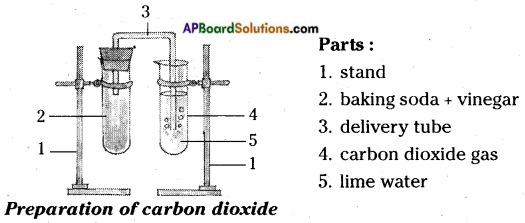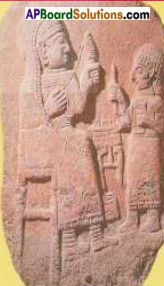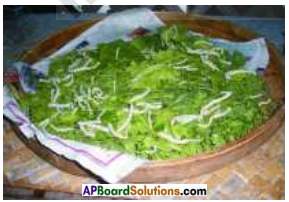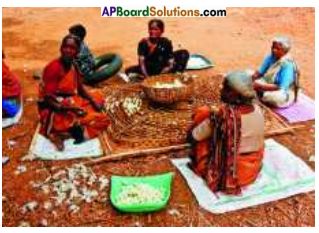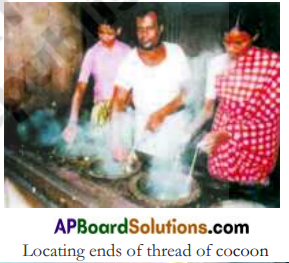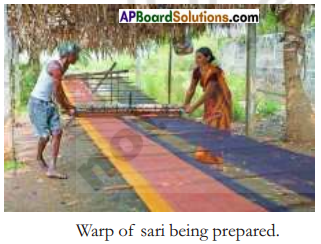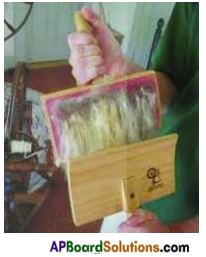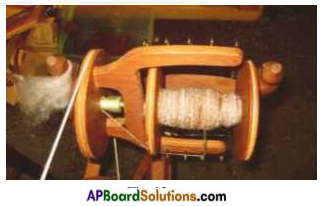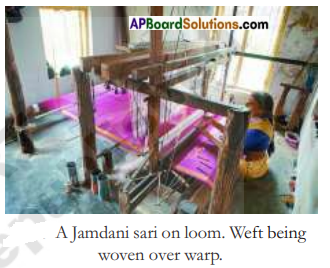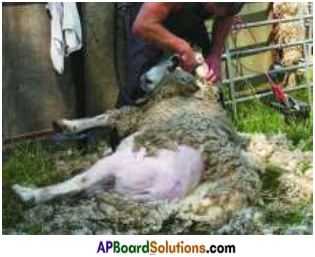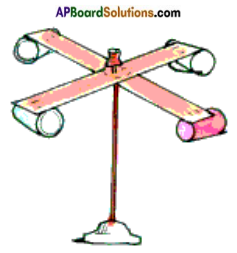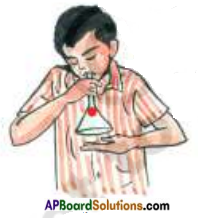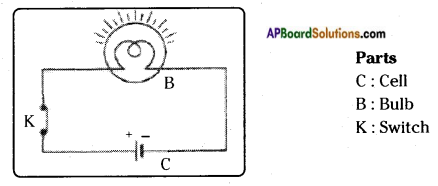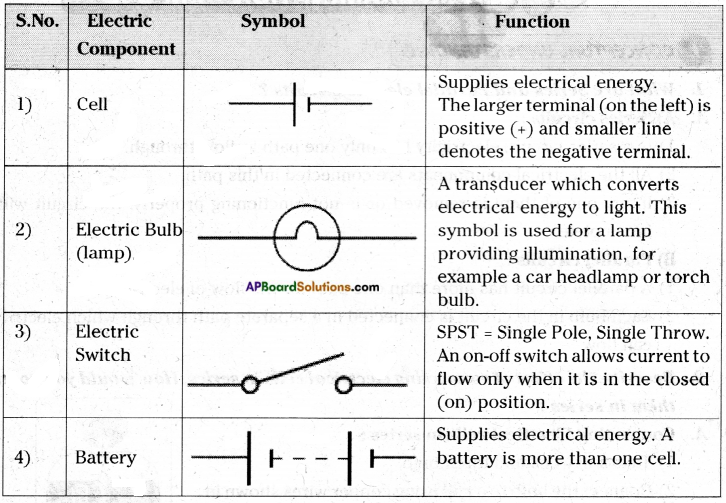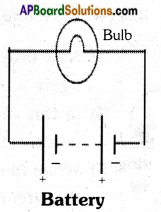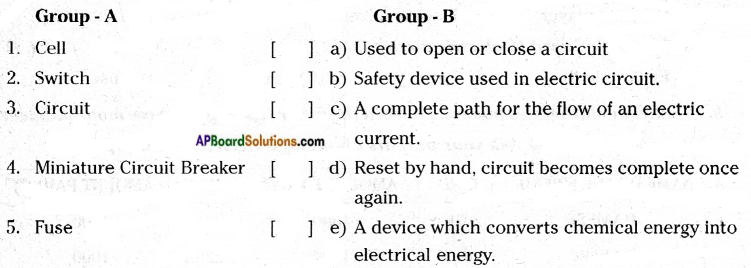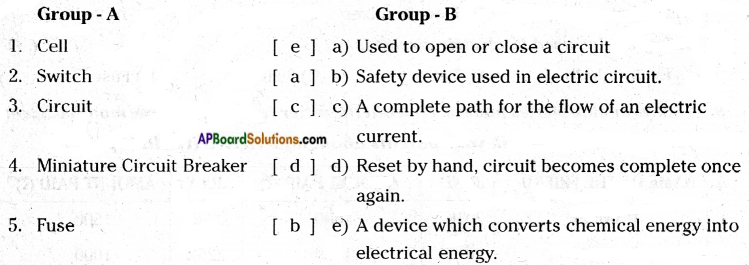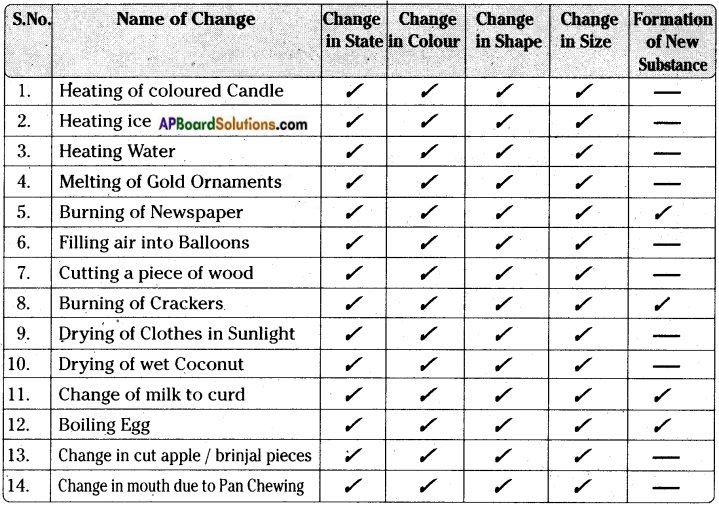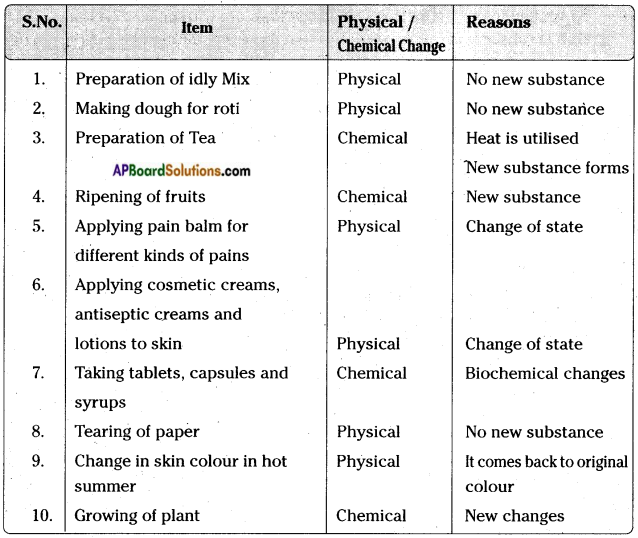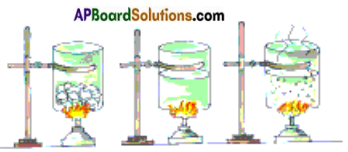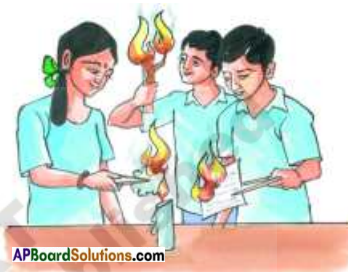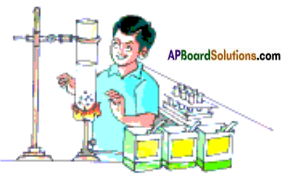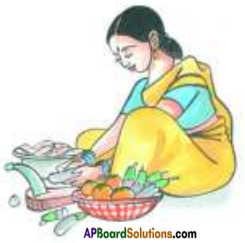AP State Syllabus 7th Class English Important Questions Unit 1
7th Class English Important Questions Unit 1
Section – A: Reading Comprehension
A. Reading
1. Read the following text.
The town mouse and the country mouse were cousins. They often wrote to each other. One day, the country mouse got this letter from his cousin.
Kitchen Cupboard,
Mouse Town.
11 March 2012.
Dear Cousin,
I have been ill with a cough and my doctor feels I need a holiday. He has asked me to spend a week in the countryside. May I stay with you? Please give me an early reply.
With warm regards,
Yours affectionately,
Town Mouse
To
Country Mouse, The Mouse Hole,
Mouse Country.
Now answer the following questions:
a) Who sent the letter to whom?
b) Where does the country mouse live?
c) Where does the town mouse live ?
d) What relation does the country mouse and town mouse have ?
e) How long does the town mouse want to stay in the country ?
f) Why does the town mouse want to visit the country mouse ?
Answers:
a) The town mouse sent the letter to the country mouse.
b) The country mouse lives in the mouse hole in Mouse Country.
c) The town mouse lives in kitchen cupboard in Mouse Town.
d) The country mouse and the town mouse are cousins.
e) The town mouse wants to stay for a week in the country.
f) The town mouse had been suffering from cough and cold and his doctor advised him to spend a week in the countryside.

2. Read the following passage.
Receiving the invitation from the country mouse, the town mouse packed his bags and caught the next train to the countryside. The day was bright and sunny and soon the town mouse began to feel hot in the train.
“I wish there was an air-conditioned coach,” he said to himself. “I feel very uncomfortable here.”
However, there was nothing he could do about it. So, he grumbled to himself while the train chugged’slowly into the country. The country mouse was waiting at the station.
“Oh, cousin,” the town mouse said as soon as he got off the train. “The train was dreadful, I feel terribly hot and thirsty. I hope you have something ice-cold for me to drink at home.”
“Well, I have some water,” said the country mouse. “But I can look around for some coconut water if you like.”
“Coconut water?” asked the town mouse in horror. “Don’t you have any orange juice or lemonade ?”
“I am afraid not,” replied his cousin. “But I found a very nice piece of root today and a tender bit of sugar-cane. I’m sure you will enjoy that.”
Now answer the following questions:
a) How was the day weather when the town mouse travelled to the country?
b) “I wish there was an air-conditioned coach,” he said to himself. “I feel very uncomfortable here” – What does this tell us about the town mouse?
c) How did the town mouse feel in the train?
d) What did the country mouse offer the town mouse as soon as he got off the train?
e) What did the town mouse ask the country mouse for ?
Answers:
a) The day was very bright and sunny when the town mouse travelled to the country.
b) It tells us that the town mouse was leading a luxurious, comfortable and civilised life in the town with all modern amenities and comforts.
c) The town mouse felt that the train was dreadful. He felt very hot and thirsty in the train.
d) The country mouse offered some water or coconut water to the town mouse as soon as he got off the train.
e) The town mouse asked the country mouse for orange juice or lemonade.
3. Read the following passage.
“I am afraid not, “ replied his cousin. “But I found a very nice piece of root today and a tender bit of sugar-cane. I’m sure you will enjoy that.”
“Root? Sugar-cane?” the town mouse exclaimed. “But I don’t eat raw food like that.”
The country mouse said, “This is what we eat in the country. So, I’m afraid you too have to eat this. Try it. It’s not bad.”
The town mouse did not enjoy his dinner at all. He nibbled at the root and the sugar-cane and then said he wanted to sleep. The country mouse showed a corner in the mouse hole and said, “There you are; you can sleep there.”
“On the ground?” asked the town mouse. “Do I have to sleep on the ground?”
“Yes, this is how we sleep in the country,” his cousin answered.
As the town mouse lay down on the hard, cold ground, he suddenly thought of something. “Cousin,” he called out.
“Yes, what is it?” the country mouse asked. .
“Why is it so quiet here? Where are all the cars and lorries? Where are the radios and the televisions? Where are all the lights ?”
“This is how it is in the country,” his cousin replied. “It’s always quiet in the country. Sometimes it is quieter than today. My grandfather says that our village is the quietest among all the villages in our district.” “Oh! Is it? The country is a strange place,” said the town mouse. But he said to himself, “I don’t think I like this place.”
Now answer the following questions:
a) What did the country mouse eat in the country?
b) What does the clause ‘I am afraid’ here mean?
c) Where did the country mouse sleep?
d) What did the town mouse worry about?
e) Why did the town mouse not like the country?
Answers:
a) The country mouse used to eat raw food like roots and sugar-cane.
b) ‘I am afraid’ here means ‘sorry’. It is used to express apology;
c) The country mouse used to sleep on the ground.
d) The town mouse worried why it was so quiet in the country, why there were no radios and televisions, why there were no cars and lorries, in the country.
e) There was no delicious food such as bread, jam, fruits and chocolates in the country. There was no comfortable bed to sleep There were no buses and lorries and there was no busy life in the country. Hence the town mouse did not like the country.

4. Read the following passage.
Next morning, the town mouse found that there was no breakfast ready. His cousin told him that they had to go to the nearby farm to search for food.
“We are sure to find something there,” he said. “A nice piece of root or a tender bit of sugar-cane.”
But the town mouse had enough. “Thank you, cousin,” he said. “But I think I’ll catch the next train home. I have suddenly remembered that I have forgotten something.”
A few days later, the country mouse wrote to his cousin, the town mouse. Here is the letter.
Mouse Hole,
Mouse Country.
22 March 2012.
My dear Cousin,
I hope you are well. I am worried about you. I would like to visit you and make sure you are alright.
With love,
Your cousin,
Country Mouse
To
Town Mouse,
Kitchen Cupboard,
Mouse Town.
The town mouse received the letter and read it. Since he was in a hurry, he sent a telegram to the country mouse. Here is his telegram.
OVERJOYED (.) COME SOON (.)
TOWN MOUSE
Now answer the following questions:
a) Where had the mice to go for collecting breakfast?
b) What might they get for their breakfast?
c) Why do you think the town mouse said that he would catch the next train?
d) What did the country mouse write in his letter to his cousin?
e) “Since he was in hurry, he sent a telegram to the countryside” – What does this line suggest us about the life of the town mouse?
Answers :
a) The mice had to go to the nearby farm to search for food.
b) They might get a nice piece of root or a tender bit of sugar-cane for their breakfast.
c) The town mouse did not like the style of living.in the countryside. He was unable to adjust to the ways of the village. So he wanted to go back to the town.
d) The country mouse wrote that he was very much worried about his sick cousin. He said that he would like to visit his cousin to see whether he was alright.
e) It suggests us that in town the life of people is very busy.
5. Read the following passage.
A few days later, the.country mouse arrived in the town. He was surprised by the noise and the lights.
“Why are there lights even in the middle of the night?” he asked.
“This is the town,” his cousin replied. “Here there are lights even in the middle of the day.” “And what is this dreadful noise that never stops?” asked the country mouse.
“That is the traffic,” the town mouse replied. “That is the noise made by buses, lorries, cars and aeroplanes.”
But the country mouse did not like it at all. “All this noise has made my head ache,” he said. “Could I have some water to drink?”
“Why only water?” said the town mouse. “Look at what there is for you – ice cold lemonade, orange juice … which one do you want?”
“Just some water,” answered the country mouse. “Some water and a little bit of food.”
“I have plenty of food, cousin,” said the town mouse proudly. “You can eat as much as you like.”
Sure enough, the house of the town mouse at the back of a kitchen cupboard was full of most delicious food.

Now answer the following questions:
a) What surprised the country mouse in the town?
b) Where did the noise come from?
c) Why did the country mouse not like the noise in the town?
d) What did the town mouse offer his cousin when he asked for water?
e) Why did the town mouse say proudly that he had a plenty of food?
Answers :
a) The country mouse was surprised by the noise and lights in the town.
b) The noise came from the traffic. This noise was made by buses, lorries, cars and aeroplanes.
c) His village was very peaceful. There was no traffic in the country. There were no buses, lorries, cars and aeroplanes in the village.
d) The town mouse offered his cousin ice-cold lemonade, orange juice.
e) In the town a lot of delicious food was available, but in the village every time they were
hungry they had to search for food here and there.
6. Read the following passage.
There was bread and jam, different kinds of fruits, slabs of chocolate and a huge piece of lovely cheese.
“Eat, cousin, eat,” said the town mouse. But just then, there was a sound like a thunder and the town mouse shouted. “Run, cousin, run, run.”
The town mouse pushed the country mouse out through a hole in the back of the cupboard. The country mouse felt his heart beating very fast, “But what is it?” he asked.
“Sssh. ..” whispered the town mouse. “Wait.”
When everything was silent again, the town mouse crept out of the hole. He was quite cheerful again.
“Come out now, cousin,” he said. “That was only somebody opening the cupboard door. We are safe now.”
But they were not safe for very long. Twice more, they had to run for safety when somebody opened the cupboard door.
The country mouse got quite tired of running and hiding. “I want to go back to the country, ” he said. “We may not get much food there, but at least we can eat in peace.”
So, the next day, the country mouse went back to his house in the country and the town mouse stayed on in his cupboard in the town. And as far as I know, they did not visit each other again.
Now answer the following questions.
a) “There was bread and jam, different kinds of fruits” What difference do you find between the food available in the country and that of the town?
b) Where did the town mouse live?
c) “But just then, there was a sound like a thunder” – Where did the sound come from?
d) “We are safe now” – Were they really safe now? Why / Why not?
e) The country mouse wanted to go back to the country. Why?
Answers:
a) In the country the mice had to search for food which was raw and traditional but in the town variety of food was readily available, cooked and delicious.
b) The town mouse lived at the back of the cupboard.
c) The sound came from the opening of the cupboard door.
d) No. They were not really safe. They had to run for safety every time the door of the cupboard was opened.
e) The country mouse got quite tired of running and hiding. Though he did not get much food in the country he could live peacefully and safely there.

7. Read the following passage.
The town mouse and the country mouse were cousins. They often wrote to each other. Receiving the invitation from the country mouse, the town mouse packed his bags and caught the next train to the countryside. The day was bright and sunny and soon the town mouse began to feel hot in the train.
“I wish there was an air-conditioned coach,” he said to himself. “I feel very uncomfortable here”. However, there was nothing he could do about it. So, he grumbled to himself while the train chugged slowly into the country. The country mouse was waiting at the station. “Oh, cousin,” the town mouse said as soon as he got off the train. “The train was dreadful, I feel terribly hot and thirsty. I hope you have something ice-cold for me to drink at home.”
“Well,’I have some water,” said the country mouse. “But I can look around for .some coconut water if you like.” “Coconut water?” asked the town mouse in’horror. “Don’t you have any orange juice or lemonade?”
Now, answer the following questions.
a) Describe how the town mouse felt in the train.
b) Why is the town mouse travelling to the countryside?
c) “Coconut water?” asked the town mouse in horror. “Don’t you have any orange juice or lemonade?”
Based on the above lines from the passage, what can we say about the town mouse?
d) What food was arranged by the country mouse for the town mouse?
e) Why was the town mouse feeling thirsty?
Answers:
a) The town mouse felt hot and uncomfortable in the train. He wished that there was an air- conditioned coach in the train. But he couldn’t do anything about it.
b) The country mouse invited the town mouse to visit the countryside. So, the town mouse was travelling to the countryside.
c) The town mouse was enjoying the varieties of food and luxuries available in the town. It felt strange as the countryside did not have those facilities. The town mouse was not happy and could not adjust with the simple and natural things of country life. He wanted to have all the luxurious items.
d) A nice piece of root and a tender bit of sugarcane was arranged for dinner.
e) The town mouse felt thirsty because he had travelled in a train on a sunny day and was feeling hot.
8. Read the following passage.
Receiving the invitation from the country mouse, the town mouse packed his bags and caught the next train to the countryside. The day was bright and sunny and soon the town mouse began to feel hot in the train.
“I wish there was an air-conditioned coach,” he said to himself. “I feel very uncomfortable here.”
Now, answer the following questions.
a) Who sent the invitation to the town mouse?
b) How was the town mouse going to the countryside?
c) How was the weather?
d) What did the town mouse wish to have?
e) Why did the town mouse wish to have it?
Answers :
a) The country mouse sent the invitation to the town mouse.
b) The town mouse was going to the countryside by a train,
c) The weather was very hot.
d) The town mouse wished to have an air conditioned coach.
e) In the town the town mouse used to live with all comforts such as air condition. He was unable to withstand the heat of the sun. So he wished to have an air-conditioned coach.

9. Read the following passage.
Next morning, the town mouse found that there was no breakfast ready. His cousin told him that they had to go to the nearby farm to search for food. ‘We are sure to find something there,” he said. “A nice piece of root or a tender bit of sugar-cane.” But the town mouse had enough. ‘Thank you, cousin,” he said. “But I think I’ll catch the next train home. I have suddenly remembered that I have forgotten something.”
Now, answer the following questions.
a) What did the town mouse find?
b) Where will they find the food?
c) Why did the town mouse want to go home?
d) What reason did the town mouse give for going home?
e) Identify two food items mentioned in the passage.
Answers:
a) that there was no breakfast ready
b) in a nearyby farm
c) The town mouse used to have varieties of ready made and delicious food in the town. But now here in the countryside it has to go the fields in search of raw food. So the town mouse wanted to go home.
d) The town mouse told that he suddenly remembered that he had forgotten something.
e) root and sugarcane
B. Reading
1. Read the following stanza.
I live in the town
In a street;
It is crowded with traffic
And feet;
There are buses and motors
And trams;
I wish there were meadows
And lambs.
Now answer the following questions:
a) Who does ‘I’ in the above stanza refer to?
b) Where does the speaker live?
c) How is the street where he lives?
d) Why is there a lot of traffic?
e) Does the speaker like the town?
f) What does he wish?
g) How does the speaker like his place to be?
h) Where does the speaker want to live?
i) Why does the speaker not like the town?
j) Where do you expect the meadows and lambs-in towns or in the country ?
k) Pick out the rhyming words from the stanza.
Answers :
a) ‘I’ in the above stanza refers to the town child.
b) The speaker lives in the town.
c) The street is full of traffic and pedestrians.
d) Because there are a lot of buses, motors and trams.
e) No. The speaker (the town child) does not like the town.
f) He wishes that there were meadows and lambs.
g) The speaker likes his place to be beautiful with meadows and animals.
h) The speaker wants to live in a village which is full of meadows and animals.
i) The town is completely congested with full of buildings and traffic. There are no meadows and animals which make the nature beautiful in the town. So he does not like to live in a town.
j) We can expect the meadows and lambs in the villages but not in the town.
k) 1) street…. feet; 2) trams – lambs.

2. Read the following stanza.
The houses all wait
In a row,
There is smoke everywhere
That I go.
I don’t like the noises
I hear.
I wish there were woods
Very near.
Now answer the following questions:
a) Who is speaking in this stanza?
b) How are the houses built?
c) ‘There is a smoke everywhere” – What does ‘there I here refer to? (Or) Where is the smoke?
d) Why is there a lot of smoke everywhere?
e) What does he not like?
f) Where do these noises come from?
g) What does the speaker wish?
h) Why does the speaker want to have ‘woods’ near his place?
i) What do you understand from the wish of the speaker?
j) Pick out the rhyming words from the stanza.
Answers :
a) The town child is speaking in this stanza.
b) The houses are built in a row.
c) ‘There’ here refers to the town. (Or) The smoke is everywhere in the town.
d) Because in town there are a lot of factories, hotels, industries and a lot of cars, buses, trams and lorries. They emit a lot of smoke.
e) He does not like the noises and smoke from the factories, industries and vehicles.
f) These noises come from the vehicles, industries and factories.
g) The speaker wishes to have forests or woods near his town.
h) The speaker wishes to have forests near his town because the trees of the forests help to control pollution by absorbing the carbon dioxide.
i) We understand that the speaker wants to live peacefully away from the noise and pollution of the town.
j) row – go; hear – near.
3. Read the following stanza.
There is only one thing
That I love,
And that is the sky
Far above,
There is plenty of room
In the blue
For castles of clouds
And me, too!
Now answer the following questions :
a) Who does ‘I’ here refer to?
b) What is the only thing the speaker loves?
c) Why does he like sky?
d) “In the blue” – What does the word ‘blue’ here mean?
e) What castles are there in the sky?
f) “And me too’ – Where does the speaker want to be?
g) Why does the speaker want himself to be in castles of clouds?
h) What is the plenty of room there in the sky for?
i) Which word in the above stanza means “large strong buildings”?
j) Pick out the rhyming words from the stanza.
Answers:
a) ‘I’ here refers to the town child.
b) The only thing the speaker (the town child) loves in the town is the sky.
c) Because in the sky there is a lot of room and there are no buildings and vehicles, noise and smoke in the sky.
d) The word ‘blue’ here means the ‘sky’.
e) In the sky there are castles of clouds.
f) The speaker wants to be in the sky.
g) Because in the castles of clouds there is no smoke and noise and there is a lot of open place in the sky. In the sky he can be away from pollution and helter- skelter of the town.
h) In the sky there is a lot of room for the castles of clouds.
i) Castles
j) love … above; blue – too.

4. Read the following stanza.
My home is a house
Near a wood
(I’d live in a street
If I could!)
The lanes are so quiet,
Oh, dear!
I do wish that someone Lived near.
Now answer the following questions:
a) Who is speaking in this stanza?
b) Where is the speaker’s house?
c) Where does he want to live?
d) How are the lanes?
e) Why are the lanes so quiet?
f) What does the speaker wish?
g) Which word in the stanza means “an area of trees smaller than a forest”?
h) Who does the speaker address as ‘dear’?
i) “I wish that someone lived near” – What do you understand from this sentence?
j) Pick out the rhyming words from the stanza.
Answers:
a) The country child is speaking in the stanza.
b) The speaker’s house is near a wood.
c) The speaker (The country child) wants to live in a street in the town.
d) The lanes in his village are so quiet.
e) Because there are a few people in the village.
f) The speaker wishes that someone lives near his house.
g) ‘wood’
h) The speaker addresses the readers as ‘dear’.
i) In the country very few people live and there are no one to play with him. So he wishes someone to live in his neighbourhood.
j) wood …. could ; dear …. near.
5. Read the following stanza.
There is no one to play with
At all,
The trees are so high
And so tall;
And I should be lonely
For hours,
Were it not for the birds
And the flowers.
Now answer the following questions:
a) Why is there no one to play with?
b) How are the trees?
c) Why are the trees so high and tall?
d) How is he in the country?
e) Were it not for the birds and the flowers’ – What does this clause mean?
f) Who are the friends for him in the country?
g) When should he be lonely?
h) What does the poet want to describe in the stanza?
i) Why does the speaker not want to live in the village?
j) Pick out the rhyming words from the stanza.
Answers:
a) Because it is the country and very few people live there.
b) The trees are high and tall.
c) Because in the country there is a lot of place. In the town all the trees are cut down for want of site for construction of houses, factories and roads.
d) He is lonely in the country.
e) It means that if the birds and flowers were not there, he should be lonely in the country.
f) The birds and flowers are his friends in the country.
g) If the birds and animals were not there, he should be lonely.
h) The poet wants to describe why the country child does not like to live in the „ country.
i) The speaker does not like to live in the country because there are no one to give company to him in the country.
j) all – tall; hours – flowers.

6. Read the following stanza.
I wish that I lived
In a town
To see all the trams
Going down
A twinkling street
That is bright
With wonderful colours
At night!
Now answer the following questions:
a) Who does ‘I’ here refer to?
b) Where does the speaker live?
c) What does the speaker wish?
d) Why does he want to live in a town?
e) What attracts him to the town life?
f) How are the streets in the town at night?
g) What does the poet want to describe in the stanza?
h) Pick out the rhyming words in the stanza.
i) Why are the nights colourful in towns?
j) If you were given an option to live in a town or a country, where would you prefer to live?
Answers:
a) ‘I’ here refers to the country child.
b) The speaker lives in a country.
c) The speaker wishes to live in a town.
d) In a town he can see the trams, the bright lights, colourful nights. They make him wish to live in a town.
e) The trams, the colourful nights and the bright lights attract him to the town life.
f) The streets are bright and colourful in the town at night.
g) The poet wants to describe why people are attracted to the city life in the stanza.
h) town – down; bright – night.
i) The town wakes up all the night and some activity or other goes on all the night in the town. So the nights are bright and colourful in the town.
j) If I were given an option to live in a town or in a country, I would prefer to live in a country.
7. Read the following stanza.
The Town Child
I live in the town
In a street;
It is crowded with traffic
And feet;
There are buses and motors
And trams;
I wish there were meadows
And lambs.
The houses all wait
In a row,
There is smoke everywhere
That I go.
I don’t like the noises
I hear –
I wish there were woods
Very near.

Now, answer the following questions:
a) Where does the ‘speaker’ live?
b) Pick out any two vehicles from the poem.
c) What does the speaker find everywhere?
d) Pick out the word that rhymes with ‘trams’.
e) What does the speaker want to be very near?
Answers:
a) The speaker lives in a town.
b) Buses and trams
c) The speaker finds smoke everywhere.
d) ‘lambs’
e) The speaker wants to have woods very near.
C. Reading
1. Read the following passage.
When spring came to the city of Cleveland in 1909, it did not change Gates Avenue.
People who lived on the pretty streets near Gates Avenue were making gardens and painting their houses. But Gates Avenue continued to ‘look dirty and ugly.
Gates Avenue was a short street, but it seemed longer because it was so ugly. Most of the families who lived there had very little money. They never expected to have any more. Their houses had not been painted in many years, and they did not even have n.inning water.
The street itself was ugly too. There was no pavement, there was no streetlight; and the railroad’ at the end of Gates Avenue added noise and dirt.
Now answer the following questions:
a) Why did Gates Avenue seem longer though it was short?
b) Why were the houses not painted in Gates Avenue?
c) What facilities did they not have in Gates Avenue street?
d) What added noise and dirt to Gates Avenue?
e) Who were making gardens and painting their houses?
Answers:
a) Gates Avenue seemed very long because it was very much ugly and dirty.
b) because the people in Gates Avenue were very poor.
c) Gates Avenue did not have pavement and streetlight.
d) The rail road at the end of the street added noise and dirt to Gates Avenue.
e) People who lived on the pretty streets near Gates Avenue were making gardens and painting their houses.
Additional Questions
a) What is the name of the street mentioned in the passage?
b) En what way was Gates Avenue different from other streets?
c) Why was Gates Avenue ugly and dirty?
d) What made Gates Avenue look very ugly?
e) Where is Gates Avenue?
f) Why did the other streets in Cleveland look pretty?
g) “….. they did not even have running water’ – What does the phrase ‘running water’ here mean?
Answers:
a) Gates Avenue was the name of the street.
b) While all the other streets were made-beautiful by growing gardens and painting houses Gates Avenue looked dirty and ugly.
c) 1. The people living in Gates Avenue were very poor.
2. They could not afford to paint their houses.
3. There was no proper drainage system in the Avenue.
4. The street itself was ugly.
5. Lack of pavements and drainage system and the existence of the rail gate at the end of the street made the street even more ugly.
d) The rail road at the end of the street made the street even more ugly.
e) Gates Avenue is in Cleveland.
f) The people in other streets made their streets look beautiful by growing gardens and painting their houses.
g) Water supply system through pipes and taps

2. Read the following passage.
The other girls in the school near Gates Avenue wore new and pretty clothes that spring. But the little girl from Gates Avenue still wore the dirty dress that she had worn all winter. Probably that was the only dress she owned.
Her teacher was very unhappy. The little girl was so nice! She always worked hard in school; she was always friendly and polite. Her face was dirty and her hair was untidy, but anyone could see that she was pretty under the dirt.
One day the teacher said, “Won’t you wash your face before you come to school tomorrow morning? Please do that, just for me.
The next morning the child’s pretty face was clean, and her hair tidy. Before the little girl went home that afternoon, the teacher said, “Now, dear, please ask your mother to wash your dress.”
But the girl continued to wear the same dirty dress, “Her mother is probably not interested in her,” the teacher thought. So she bought a bright blue dress and gave it to the little girl. The child took the gift eagerly and rushed home.
Now answer the following questions:
a) Why did the girl wear the dirty dress?
b) “Probably that was the only dress she owned” – How can you say?
c) Why was the teacher unhappy?
d) Why would all the people say, “She was pretty under the dirt”?
e) What kind of girl was she?
f) “Please do that just for me.” – What does the word ‘that’ here mean?
g) Why did the girl look pretty the next day?
h) What did the teacher request the girl the next day?
i) Why did the girl continue to wear the same dirty dress?
j) What did the teacher do on the third day to make her look beautiful?
Answers:
a) Because the girl was poor and she owned only one dress.
b) 1. She was very poor.
2. She used to wear the same dress every day.
c) Because though the girl was so nice her face was dirty and her hair was untidy.
d) Naturally she was very pretty and beautiful but her face was dirty and her hair was untidy. So everyone would say she was pretty under the dirt.
e) She was a nice girl. She always worked hard in school. She was always friendly and polite.
f) ‘That’ here means washing her face before coming to school.
g) Because the next morning the girl washed her face and had her hair combed.
h) The next morning the teacher requested the girl to get her dress washed.
i) Because she had only one dress and she would not have had another dress if she had got it washed.
j) On the third day the teacher bought a new blue dress and gave it to the girl to make her look beautiful.
3. Read the following passage.
The next morning she came to school in the new blue dress, and she was very clean and tidy. She told her teacher, “My mother couldn’t believe her eyes when she saw me this morning in my new dress. My father wasn’t at home, but he’ll see me at supper tonight.” She was full of excitement.
When her father saw her in her new blue dress, he was amazed to find that he had a very pretty little girl. When the family ate supper, he was even more amazed to see a cloth on the kitchen table-, The family had never used a table cloth before. “We’re going to begin to be tidier here,” his wife said. “I’m ashamed to be dirty when our daughter is so clean.”
After supper, the mother began to wash the kitchen floor. Her husband watched silently for several moments. Then he went outside and began to repair the fence. The next evening, with the family’s help, he began to make a garden.
Now answer the following questions:
a) How did the girl look the next morning when she came to school?
b) Why was she very clean and tidy the next morning?
c) Why could her mother not believe her eyes?
d) Why was the girl full of excitement?
e) What made her father amazed?
f) What made her father even more amazed?
g) What did her father decide?
h) Why was her mother ashamed?
i) What did her mother do to be tidier?
j) What did her father do to keep the surroundings clean?
Answers:
a) The girl was very clean and tidy the next day.
b) Because she washed her face, combed her hair and wore a new blue dress.
c) Because the girl looked beautiful in her blue dress.
d) Because she looked beautiful in her blue dress and her parents were happy to see her beautiful face.
e) Her father was amazed to know that his daughter was very beautiful.
f) When he saw a cloth on the kitchen table he was even more amazed.
g) Her father decided to begin to be tidier thereafter.
h) Her mother was ashamed to be dirty when their daughter was so clean.
i) She began to wash the kitchen floor after supper.
j) Her father repaired the fence and he began to grow a garden to make the surroundings clean.

4. Read the following passage.
During the following week, the man in the next house watched what his neighbour was doing. And by the end of the week, the man began to paint his house — for the first time in ten years. A few days later, the young minister of a church near Gates Avenue passed these two houses and saw two men working. For the first time he noticed that there was no pavement on Gates Avenue, and no streetlight, and no running water. “People who are trying so hard to make decent homes here deserve help,” the minister thought. He asked some important citizens in the city to help them.
Now answer the following questions:
a) How did girl’s father inspire his neighbour?
b) Who came to Gates Avenue?
c) What did the young minister notice?
d) What inspired the young minister to build a pavement?
e) Why did the minister feel that the people deserved help?
f) “He asked some important citizens to help them” – Who does ‘they’ here refer to?
g) What did the minister ask the important citizens to do?
h) What were the problems the minister noticed in Gates Avenue?
i) What did the minister see at first?
j) How long had the house not been painted?
Answers:
a) When the neighbour of the girl watched her father growing a garden he was inspired and began to paint his house.
b) The young minister of a church came to Gates Avenue.
c) The young minister noticed that the pavement, streetlights and running water were not there at Gates Avenue.
d) When he came to Gates Avenue he saw two men working in front of their houses to make their surroundings clean. It inspired the minister to build a pavement.
e) When he came to Gates Avenue he saw the people working to clean their surroundings; so he felt they deserved the help.
f) ‘They’ here refers to the people of Gates Avenue.
g) The minister asked the important citizens to help the people of Gates Avenue.
h) Lack of pavements, streetlights and proper running water system were the problems in Gates Avenue.
i) At first the minister saw the men working to clean their surroundings.
j) The house had not been painted for years.
5. Read the following passage.
A few months later, because of the young minister, there was a pavement on Gates Avenue.
There was a streetlight on the corner, and the houses had running water. Six months after the little girl got her new blue dress, Gates Avenue had become a tidy street where respectable citizens lived.
When people in other places heard the story of Gates Avenue, they began to organise their own ‘clean up’ campaigns. Since 1913, more than seven thousand towns and cities have organised campaigns for painting and repairing homes and making better lives for the people who live in them.
Who knows what will happen when a teacher gives a little girl a new blue dress?
Now answer the following questions:
a) Who was responsible for building a pavement?
b) What were the other services provided by the minister?
c) How long did it take to get a tidy street for Gates Avenue?
d) Now what type of citizens live in Gates Avenue?
e) How did the experience of Gates Avenue inspire the other places in the city?
f) When did the ‘clean up’ campaign begin in Cleveland?
g) Who do you think initiated the’clean up’campaign in Gates Avenue?
h) What type of activities were taken up as a part of ‘cleaning up campaign’?
i) Do you know any such campaign is going on in our country now? Name that campaign.
j) According the passage, how many towns and cities have organized ‘clean up’ campaigns since 1913?
Answers:
a) The young minister of the church was responsible for building a pavement.
b) The minister provided streetlight, and running water system in addition to the pavement in Gates Avenue.
c) Gates Avenue took six months after the girl had got a new dress to get a tidy street.
d) Now respectable citizens live ip Gates Avenue.
e) Having been inspired by the people of Gates Avenue the people of other places began to organise their own ‘clean up’ campaigns.
f) The ‘clean up’ campaign began in 1913 in Cleveland.
g) The ‘clean up’ campaign was actually initiated by the teacher who bought a new dress for the poor girl.
h) As a part of cleaning up campaign people took up painting, and repairing homes and making better lives for the people who live in it.
i) Yes. One such ‘clean up’ campaign is going on in our country now. The massive ‘clean up’ programme is called ‘Swatchch Bharath’ (Clean India). It was started by our Prime Minister Narendra Modi on 2nd October 2014.
j) More than seven thousand towns and cities.

6. Read the following passage.
The little girl from Gates Avenue wore the dirty dress that she had worn all winter. Probably that was the only dress she owned. Her teacher was very unhappy. The little girl was so nice! She always worked hard in school; she was always friendly and polite. Her face was dirty and her hair was untidy, but anyone could see that she was pretty under the dirt. One day the teacher said, “Won’t you wash your face before you come to school tomorrow morning? Please do that, just for me.”
The next morning the child’s pretty face was clean, and her hair tidy. Before the little girl went home that afternoon, the teacher said, “Now, dear, please ask your mother to wash your dress. “But the girl continued to wear the same dirty dress, “Her mother is probably not interested in her” the teacher thought. So she bought a bright blue dress and gave it to the little girl. The child took the gift eagerly and rushed home. The next morning she came to school in the new blue dress, and she was very clean and tidy. She told her teacher, “My mother couldn’t believe her eyes when she saw me this morning in my new dress. My father wasn’t at home, but he’ll see me at supper tonight.” She was full of excitement. When her father saw her in her new-blue dress, he was amazed to find that he had a very pretty little girl.
Now, answer the following questions.
a) What was the teacher’s opinion about the girl’s mother?
b) Why was the teacher unhappy?
c) What kind of girl was the little girl in the. above passage?
d) Why would all people say “She was pretty under the dirt”?
e) Describe the nature of the teacher based on the story.
Answers:
a) The teacher’s opinion was that that the girl’s mother was probably not interested in the tidy appearance of her daughter.
b) Because the girl wore the same dirty dress every day and had an untidy appearance.
c) She was a nice girl. She always worked hard in school. She was always friendly and polite.
d) Naturally she was very pretty and beautiful but her face was dirty and her hair was untidy.
So everyone would say she was pretty under the dirt.
e) The teacher was kind, caring and helpful in nature. She gave good advice to the girl and also brought Tier a new dress. She was really interested in her well-being. She wanted to help her to maintain a tidy appearance.
Unseen Comprehension
1. Read the following passage carefully.
An elephant does not work mechanically, like many other animals. He never stops learn¬ing because he is always thinking. Not even really a good sheep – dog can compare with an elephant in intelligence. An elephant never forgets. His little actions reveal an intelligence which finds in prompt solutions for new difficulties. If he cannot reach with his trunk some part of his body that itches, he does not rub it against a tree; he may pick up a long stick and give Himself a good stretch with that instead. If he pulls up some grass, and it comes up by the roots with a lump of earth, he will smack it against his foot until all the earth is shaken off or, if the water is handy, he will wash it clean, before putting it into his mouth.
Now answer the following questions.
a) Why does the elephant never stop learning?
Answer:
The elephant never stops learning because he is always thinking.
b) Write at least two actions which prove that the elephant is an intelligent.
Answer:
i) If he cannot reach with his trunk some part of his body that itches, he picks up a long stick and gives himself a good stretch with that instead.
ii) If he pulls up some grass, and it comes up by .the roots with a lump of earth, he will smack it against his foot, until the earth is shaken off.

Choose the correct answer from the choices given.
c) Why does an elephant want a long stick? ( )
i) To dig out a lump of earth
ii) To smack it against his foot
iii) To rub that part of his body that itches
iv) To defend himself from the enemy
Answer:
iii) To rub that part of his body that itches
d) Why does the elephant smack some grass against his foot? ( )
i) To grind it
ii) To shake off the grass
iii) To rub his body with it
iv) To chew the roots
Answer:
ii) To shake off the grass
e) What does the elephant do before putting the grass roots with a lump of earth into his mouth ? ( )
i) He smacks it against his foot.
ii) He washes it clean.
iii) He either smacks it against the foot or washes it clean.
iv) He lifts it with his trunk and grinds it under his feet.
Answer:
iii) He either smacks it against the foot or washes it clean.
2. Read the following passage carefully.
Newton had a little dog. He called it Diamond. One day it was lying in his reading room. In the room there were heaps of papers and writings and a lighted candle on a table. Newton left the room for a few minutes and suddenly Diamond jumped upon the table. This caused the lighted candle to fall on the papers. All the papers caught fire and were burnt to ashes. On coming back, Newton saw to his surprise, what Diamond had done. But he did not strike the dog. He rather patted his head and said, ‘Diamond, you do not know-what mischief you have done.”
Now answer the following questions.
a) What were the things lying on the table?
Answer:
There were heaps of papers and writings and a burning candle on the table.
b) How did the papers catch fire?
Answer:
Newton was away for a short time. Then his pet dog suddenly jumped upon the table. This caused the lighted candle to fall on the papers and they caught fire.
Choose the correct answer from the choices given.
c) Newton called his dog ( )
i) Prince
ii) Pearl
iii) Diamond
iv) Ruby
Answer:
iii) Diamond
d) From the passage we can understand that Newton was ( )
i) kind and cool tempered
ii) cruel and short-tempered
iii) angry and ferocious
iv) Mad and vicious
Answer:
i) kind and cool tempered
e) What did Newton do when he found that his dog burnt his papers to ashes? ( )
i) He beat the dog.
ii) He killed the dog.
iii) He patted the dog.
iv) He shouted at the dog.
Answer:
iii) He patted the dog.

3. Read the following passage carefully.
Every day I walk a half-mile from my home to the tramcar lines in the morning, and from the lines to my home in the evening. The walk is pleasant. The road on either side is flanked by red and green-roofed bungalows, green lawns and gardens. The exercise is good for me and now and then I learn something from a little incident One morning, about half-way between my front gate and the tram track, I noticed two little boys one was four years old perhaps, the other five. Playing in the garden of one of the more modest cottages. The bigger of the two was a sturdy youngster, very dark, with a mat of coarse hair on his head and coal black eyes. He was definitely a little Jamaican – a strong little Jamaican. The other little fellow was smaller but also sturdy – he was white with hazel eyes and light-brown hair. Both were dressed in blue shirts and kaki pants: they wore no shoes and their feet were muddy. They were not conscious of my standing there.
Now answer the following questions.
a) He was definitely a Jamaican. How could the writer guess it?
Answer:
His dark colour and the mat of coarse hair on his head made the writer guess that he was a little Jamaican.
b) What is the exercise for the writer?
Answer:
A half a mile walk from home to the tramcar lines in the morning and from tramcar lines to the home in the evening was an exercise for the writer.
Choose the correct answer from the choices given.
c) How was the cottage where the boys were playing? ( )
i) beautiful
ii) modest
iii) modern
iv) ugly
Answer:
ii) modest
d) What are there on either side of the road? ( )
i) green lawns and gardens
ii) red and green-roofed bungalows
iii) small cottages with tild roofs
iv) big cottages with tiled roofs
Answer:
ii) red and green-roofed bungalows
e) How old was the black boy? ( )
i) six years
ii) four years
iii) five years
iv) eight years
Answer:
iii) five years
4. Read the following passage carefully.
Of all the weapons of destruction invented by science till today, the most destructive one is the Atom bomb. Scientists have succeeded in making this after years of research. These researches first started in Germany about the beginning of the Second World War. The German scientists were afterwards engaged by America, and a big laboratory covering several square miles was set up in that country. Constant researches were carried on in America very secretly and in 1944, the scientists succeeded in making the Atom bomb. During that time the Second World War was almost coming to an end. Germany was defeated. But the small country, Japan, was still waging the war against the mighty forces of England, France and Russia and America was forced to enter the war. An Atom bomb was flown from America to Japan, and was dropped on a city, in 1945, called Hiroshima, where a Japanese army was stationed. It was a great populous city. The bomb not only killed the whole army but also levelled all the houses to the ground and nothing was left but heaps of debris. Even many people living for away received severe burns by the rays that came out of the bursting bomb.
Now answer the following questions.
a) Why was the Atom bomb dropped on Hiroshima?
Answer:
to defeat Japan.
b) What was the achievement of the scientists in 1944?
Answer:
The Atom bomb was invented.
Choose the correct answer from the choices given.
c) Who invented the Atom bomb?
i) The American scientists
ii) The German scientists
iii) The Russian scientists
iv) The French scientists
Answer:
i) The American scientists
d) Where was a big laboratory set up?
i) In America
ii) In Germany
iii) In France
iv) In Japan
Answer:
i) In America
e) When was the Atom bomb dropped on Hiroshima?
i) in 1944
ii) in 1945
iii) At the beginning of the Second World War
iv) in 1946
Answer:
ii) in 1945

5. Read the following passage carefully.
Sharks have lived on earth for more than 180 million years. Although they live in all the oceans of the world, they are found mostly in sub-tropical and tropical waters. There are about 350 kinds of sharks. The largest sharks are the whale shark and the basking shark, which feed on plankton and small fish. The adult whale shark grows to about 13 metres long, while the basking shark extends a little over 8 metres. Most of the sharks are not ferocious. On the other hand, there are a number of sharks which have killed swimmers. These killer sharks include mako, the great hammerhead, lemon, blue and of course the great white shark. The great white shark is the largest and the most dangerous of all animals known to attack hu¬mans. It weighs more than 1,300 kilograms. It can swim through rough water also at a speed of 32 kilometres per hour. However, the fastest swimmer in the shark family is the blue shark, which can swim at a speed of nearly 72 kilometres per hour.
Now answer the following questions.
a) Name some killer sharks.
Answer:
Mako, the great hammerhead, lemon, blue and the great white shark are killer sharks.
b) Where are the sharks mostly found ?
Answer:
The sharks are mostly found in sub-tropical and tropical ocean waters.
Choose the correct answer from the choices given.
c) Which shark is the most ferocious shark? ( )
i) The lemon shark
ii) The great white shark
iii) The mako shark
iv) The great hammerhead shark
Answer:
ii) The great white shark
d) What is the average speed of a white shark? ( )
i) 40 kilometres per hour
ii) 32 kilometres per hour
iii) 65 kilometres per hour
iv) 72 kilometres per hour
Answer:
ii) 32 kilometres per hour
e) What is the fastest swimmer in the shark family? ( )
i) The lemon shark
ii) The blue shark
iii) The white shark
iv) The mako shark
Answer:
ii) The blue shark

Unseen (Data Interpretation)
1. Read the following table showing fat soluble vitamins, their sources and deficiency diseases.
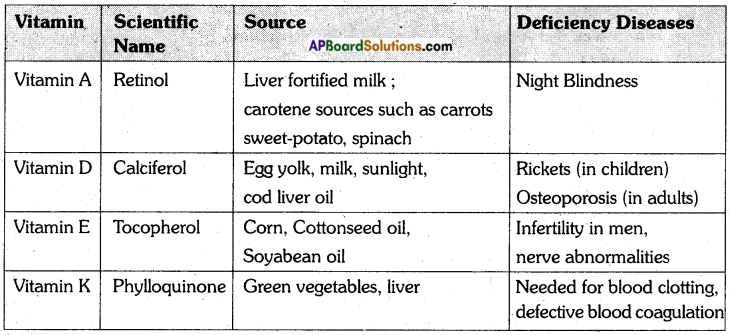
Now answer the following questions.
a) Name some sources of carotene.
Answer:
Carrots, sweet potato and spinach
b) What is the scientific name of vitamin D?
Answer:
Calciferol
c) Which vitamin deficiency causes infertility in men?
Answer:
Vitamin E
d) The deficiency of which vitamin causes defective coagulation of blood?
Answer:
Vitamin K
e) Write the names of fat soluble vitamins.
Answer:
Vitamins A, D, E & K are fat soluble vitamins.
2. Study the following table.
List of Doctors in NRI Hospital, Guntur
| Sl. No. | Name | Age | Specialisation | Native Place |
| 1. | Ramesh | 50 | Cardiologist | Vijayawada |
| 2. | Govind | 52 | Surgeon | Chittoor |
| 3. | Latha | 38 | Gynaecologist | Guntur |
| 4. | Mohan | 44 | Physician | Nellore |
| 5. | Sindhu | 28 | Dentist | Ongole |
Now answer the following questions.
a) Who is the youngest doctor of all?
Answer:
Sindhu is the youngest doctor of all.
b) Which doctor performs operations?
Answer:
Govind performs operations
Choose the correct answer from the choices given.
c) Sindhu treats the problems of ………….. ( )
i) heart
ii) teeth
iii) eyes
Answer:
ii) teeth
d) Who treats the problems of women? ( )
i) Latha
ii) Sindhu
iii) Ramesh
Answer:
i) Latha
e) Which of the following statements is true according to the data given in the table? ( )
i) Two doctors come from Guntur.
ii) Govind comes from Ongole.
iii) There is only one physician in the hospital.
Answer:
iii) There is only one physician in the hospital.

3. Read the following information of Murthy’s family.
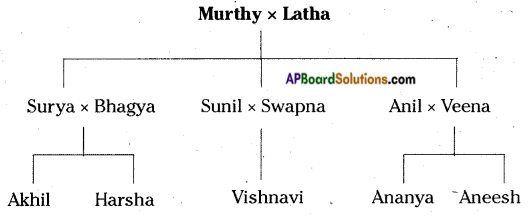
Now answer the following questions.
a) Who is Latha?
Answer:
Latha is the wife of Murthy.
b) How many grandchildren does Murthy have?
Answer:
Murthy has five grandchildren.
Choose the correct answer from the choices given.
c) Akhil is the son of ( )
i) Veena
ii) Swapna
iii) Bhagya
Answer:
iii) Bhagya
d) Aneesh and Ananya are: ( )
i) cousins
ii) brother and sister
iii) wife and husband
Answer:
ii) brother and sister
e) Which of the following is true with reference to the information given above? ( )
i) Surya has one daughter.
ii) Swapna and Veena are sisters.
iii) There are 13 members in the family.
Answer:
iii) There are 13 members in the family.

4. Study the following table given below. The table shows the average life span of some animals and birds.
| Sl. No. | Name of the animal / bird | Average life span in years |
| 1. | Asian Elephant | 80 |
| 2. | African Elephant | 70 |
| 3. | Dog | 20 |
| 4. | Eagle | 60 |
| 5. | Turtle | 125 |
| 6. | Human beings | 78 |
| 7. | Humming Bird | 8 |
| 8. | Queen been | 5 |
Now answer the following questions.
a) Which animal has the highest life span?
Answer:
Turtle has the highest life span.
b) What is the average life span of human beings?
Choose the correct answer from the choices given.
Answer:
78 years
c) The creatures which have less than 10 years of life span are ( )
i) Dog and eagle
ii) Asian elephant and African elephant
iii) Humming bird and queen bee
Answer:
iii) Humming bird and queen bee
d) The life span of an eagle is …… years. ( )
i) 70
ii) 80
iii) 60
Answer:
iii) 60
e) Which of the following statement is true as per the data? ( )
i) Human beings have less than that of the African elephant.
ii) The life span of the eagle is higher than that of the Asian elephant.
iii) The only animal which has more than a hundred years of life span is the turtle.
Answer:
iii) The only animal which has more than a hundred years of life span is the turtle.
5. Read the following pie chart showing the percentage distribution of the expenditure incurred in publishing a book.

Now answer the following questions.
a) What does the above pie-chart show?
Answer:
The pie chart shows the percentage of distribution of the expenditure incurred in publishing a book.
b) Of all the expenditures of publishing a book which costs maximum?
Answer:
Of all the expenditures of publishing a book the cost of the paper is maximum.
Choose the correct answer from the choices given.
c) Which two expenditures cost the same? ( )
i) Paper cost and royalty
ii) Royalty and Binding
iii) Printing cost and Binding
Answer:
iii) Printing cost and Binding
d) The printing cost is equal to the sum of the following two expenditures ( )
i) Binding and Royalty
ii) Transport and Royalty
iii) Transport and promotion costs
Answer:
iii) Transport and promotion costs
e) Which of the following statements is true according to the pie-chart? ( )
i) Paper cost is more than the sum of printing and transport costs.
ii) Printing cost is more than the paper cost.
iii) Expenditure on transport is equal to the expenditure of promotion.
Answer:
iii) Expenditure on transport is equal to the expenditure of promotion.

6. Study the table carefully.
Percentage of sales of fruits in India in 2015
| S.No. | Fruits | Percentage |
| 1. | Apples | 20% |
| 2. | Mangoes | 10% |
| 3. | Bananas | 50% |
| 4. | Cherries | 12% |
| 5. | Guavas | 8% |
Now, answer Hie following questions.
a) What does the table represent?
Answer:
Percentage of sales of fruits in India in 2015
b) Which fruit do Indians eat the most?
Answer:
Bananas
Choose the correct answer from the choices given.
c) Which fruit has the least demand? ( )
i) Apples
ii) Guavas
iii) Bananas
Answer:
ii) Guavas
d) What is the % of difference between the sales of guavas and bananas? ( )
i) 8%
ii) 20%
iii) 42%
Answer:
iii) 42%
e) Choose the correct statement from the following. ( )
i) Indians do not eat guavas.
ii) Apples are not available in India.
iii) The banana is the best selling fruit.
Answer:
iii) The banana is the best selling fruit.
Section – B: Creative Writing
1. In the lesson “The Town Mouse and The Country Mouse”
You have read the country mouse visited the town mouse. The country mouse could not spend his time happily in the town. He liked nothing in the town. He thought that there was ho peace in town life. He wanted to take leave of the town mouse.
Write the possible conversation between the village mouse and the town mouse. The conversation should have at least 5 exchanges.
Answer:
The Country Mouse: I’m very much thankful for your hospitality, my dear cousin. I want to take leave of you,
The Town Mouse: Why are you in hasty ? You’ve stayed here for only two days. I wont let you leave now. Stay here for a week.
The Country Mouse: My dear cousin. Thank you for your affection. But I have to go today itself.
The Town Mouse: What will you do by going there? Stay here some more time. Many worth seeing places are there in this town. I’ll show you them all if you stay some more days.
The Country Mouse: No. I can’t stay here for a minute at least.
The Town Mouse: Why can’t you stay here? Here you can have delicious, fruit juice, lemonade, air condition and so many comforts you can enjoy.
The Country Mouse: We are habituated to live with minimum needs. We can live with out all these comforts but we can not live without peace.
The Town Mouse: Only twice or thrice we have to run and hide for a day. The rest of time we can enjoy here.
The Country Mouse: Not only that, here you have a lot of noise and pollution. But in our village it is very calm. The environment is pure and fresh. We can be healthy here.
The Town Mouse: If it is so how can all the people live in the cities and towns? I have been living here since my birth. What happened to me?
The Country Mouse: It is because of this polluted atmosphere your health has been spoiled and you are advised to stay for some time in village. I cant stay here I’m going. Take care of you. Take care of your health.
The Town Mouse: Take care. Write a letter as soon as you reach village.

2. Imagine you were the town mouse.
Write a paragraph describing your feelings about your journey in the train.
Answer:
I had a lot of inconvenience in the train journey to Mouse Country. The train moved slowly. The day was bright and sunny and soon I began to feel hot in the train. The train was dreadful. It was an ordinary train. I felt terribly hot and thirsty. I wished there’was an air-conditioned coach. I felt very uncomfortable in the train.
3. You’ve read the lesson “The Country Mouse and The Town Mouse” and you have understood the sense of the lesson. People run after the city life. The glittering lights of the city, comforts of and opportunities of city life attract all the people to the city life. But there are so many things that make the city life impossible.
So write a letter to your friend describing him how the cities have become uninhabitable.
Answer:
Tenali.
22.4.20xx.
Dear Suneeth,
I’m doing very well here. I expect you are all fine and that you are also doing very well. What lesson is going for you in English. For us the first lesson ‘The Town Mouse and The Country Mouse’ has just been completed. There is a lot of message in that lesson. The lesson teachers us how the cities and cities have become uninhabitable (un-livable) these days. From the lesson we can understand that there is a lot of noisy and pollution in cities. Lakhs of vehicles and hundreds of factories emit out a lot of poisonous gases in towns and cities. Not only that the city life is not that much peaceful because of terroristic activities and other vulner-able conditions.
But unlike these uninhabitable conditions in the cities, villages are peaceful and calm. Though there are no comforts and luxuries in villages, there is a lot of peace and serenity in villages. In villages we can enjoy fresh and clean environment. People in villages are amiable, innocent and helpful. They are sympathetic with others. Hence I too feel that the villages are habitable in all respects.
I think the lesson has been completed for you. Write your feelings about the lesson. Please convey my regards to your parents and best wishes to your sister.
Yours lovingly,
xxxxxx
Address on the Envelope:
E. Vineeth.
H.No.: 1-27-30/1,
Kothapet,
Tenali,
Guntur (dt).
4. You are the Town Mouse. On your doctor’s advise you have gone to the village to spend some days there. But you have felt the life in village is very difficult. There are no comforts and conveniences in village what you enjoy in city life. You have to go out searching for food.
Write a diary entry about your feelings of your stay in the village.
Answer:
The village life – a horrible experience
22.4.20xx (Friday),
Dear Diary,
Last week the doctor advised me to spend a week in the country because I had been suffering from cough. So I went to my cousin’s village. My cousin is an innocent man with a genuine love. 1 boarded a train. There began my difficulties. There was no an air-conditioned coach in the train. 1 felt terribly hot and thirsty. My cousin received me at the station. I asked for some cool drink either lemonade or an orange juice. But he offered me some water or coconut water. I eat delicious food such as bread and jam; different kinds of fruits, chocolate and cheese. But in the village I was offered roots and sugarcane. We had to go into the fields in search of food. There are no vehicles in the village. Village is very quiet. There are no glittering lights in the village. The life there is very slow. People are .uncivilised. At night I was asked to lie on the hard cold ground. There was no any kind of entertainment in the village – no TVs and radios. In the country the life is horrible. I was unable to adjust with it. So I returned to the town. And I have decided not to visit the village again in my life.

5. In the poem The Town Child, you have read about the feelings of a boy who lives in a town. Imagine that you were a town child. Describe your feelings as expressed in the poem.
Use the following hints to describe your feelings:
Live in a town – crowded roads – heavy traffic – buses, motors and trams – wish to have meadows – houses in a row in town – smoke is seen everywhere – do not like noise – wish to have woods very near – love the sky and the castles of clouds.
Answer:
I live in a town. The roads of our town are very much crowded. There is a heavy traffic on the roads of our town. The roads are always busy with buses, motors and trams. I wish our town had beautiful meadows and lambs.
The houses in our town are in a row. In our town smoke is seen everywhere. 1 don’t like the noise. I wish we had woods very near to our town. Sky is the only place in our town which has plenty of room. I love the sky and the castles of clouds.
6. In the poem The Country Child’ you have read about the feelings of a boy who lives in a village. Imagine that you were a country child. Describe your feelings as expressed in the poem.
Use the following hints to describe your feelings:
Live in a country – quiet streets -few children to play with – feels lonely for hours – tall trees – useful only for birds and flowers – no trams or vehicles – no twinkling streets – wishes to have streets full of wonderful colours and bright lights.
Answer:
I live in a country. The streets in our countryside are very quiet. We have only very few children to play with. I feel lonely for being alone for hours. There are tall trees in our country. They are useful only for birds and flowers. There are no trams and vehicles in our village. There are no twinkling streets in our village. 1 wish my village had full of wonderful colours and bright lights.
7. In the lesson The Town Mouse and the Country Mouse’ there is a description of town life and country life. Your school is celebrating ‘World Environment Day’. You wish to give a speech about the greatness of village life.
You can use the following hints and write a script for the speech:
Village life – peaceful – pure air – water – green trees -fruits – crops – songs of birds – innocent people – no pollution – no disturbing sounds from factories – vehicles – loud speakers – well connected to outside world – low cost of living – good for health.
Answer:
Respected teachers and my dear friends,
Good morning to everyone. Today on the occasion of ‘World Environment Day’ I would like to speak about the greatness of village life.
Village life, is very peaceful. Air is pure. Water is pure and plenty in villages. There is no water scarcity. There are green trees everywhere. We can have different types of fruits. Differ¬ent types of crops are grown in villages. People are innocent. There is no pollution in villages. There are no disturbing sounds from factories, vehicles and loudspeakers. Villages are well connected to outside world. Cost of living in villages is very low. Village life is good for health. Thank you one and all for giving me this opportunity.

8. In the lesson The Town Mouse and Country Mouse’, you have read about the feelings of the country mouse when it visited the town. There were different food . items in the cupboard.
Write a description of the Country Mouse when it saw the food items in kitchen. Include the details of kitchen cupboard.
Use the following hints to describe the feelings.
Bread and jam, fruits, chocolate, piece of lovely cheese and others.
Answer:
The house of the town mouse at the back of a kitchen cupboard was full of most delicious food. Different kinds of food items in large amounts are there in his house. There was bread and jam; different kinds of fruits : slabs of chocolate and a huge piece of lovely cheese. The town mouse proudly offered all these items to the country mouse and asked him to eat as much as he wanted. The country mouse was surprised when he saw the food items in the kitchen. Someone opened the cupboard door. The town mouse and the country mouse had to run for safety. The country mouse got tired of running and hiding. He could eat nothing.
9. In the lesson The Town Mouse and the Country Mouse’, you have read about the feelings of the Town Mouse who lives in a town. He does not get his favourite food. It is very hot outside. He does not get even drinks like lemonade. Imagine that you were a town mouse. Describe your feelings as expressed in the context.
Use the following hints to describe your feelings: very hot – no lemonade- no orange juice – only coconut water – sugar cane and roots – wish to go back to town.
Answer:
My visit to Mouse Country is a horrible experience. It was very hot outside in the village. I could not get even drinks like lemonade or orange juice. My cousin offered me some water or coconut water. I eat delicious food such as bread and jam, different kinds of fruits, chocolate and cheese. But in the village I was offered roots and sugarcane. We had to go into the fields in search of food. Village life was very quiet. There were no vehicles in the village. There were no glittering lights. There was no any kind of entertainment in the village. So I returned to the town.
10. You must have read the lesson “The New Blue Dress” It is about how one can fascinate the people about the cleanliness and hygiene. Initiated by a school teacher the people of Gates Avenue got influenced and tried to improve hygiene in their locality. On seeing them ‘clean up’ campaigns were organised in whole city to make it clean.
In our country also our Prime Minister initiated the clean India (Swatchch Bharat) programme. You must have read about it. You must have also partici¬pated in Swatchch Bharat programmes organised by your school. Write a report on Swatchch Bharat that is organised in your school.
Answer:
Swatchch Bharat in Municipal Boy’s High School, Tenali
Tenali.
21.4.20xx.
Responding to the call of the our honourable Prime Minister Swatchch Bharat is organised . by the Municipal Boys High School, Tenali. The programme was started with a small meeting. The M.R.O of Tenali presided over the meeting. The local M.L.A and the R.D.O were the chief guests. The chief guests stressed the need of cleanliness in their speeches. They taught about the need to maintain basic hygiene and sanitation in schools, in their surroundings and in all over the city. Later all the students cleaned their classrooms, whole campus and cleaned their ‘ toilets and removed the filth from the school compound. Teachers, leaders and even the M.L.A, M.R.O, and R.D.O participated in cleaning programme. M.L.A made all the students and teachers swear to keep their surroundings of school always clean. A march was organised and it was led by the M.L.A. All the children gave slogans “Cleanliness is next to godliness”, “Health is wealth” and “Cleanliness brings dignity to people, and the country”’ The programme ended with all the children forming a human chain at Sivaji Chowk. The programme ended with the singing of the national anthem Jana Gana Mana”.

11. You are going to celebrate your birthday next Saturday You want to celebrate it in grandscale at your house. 1-7-2/A; Malladivari Street; Nazer pet, Tenali.
Write a letter to your friend inviting him to the celebration.
Answer:
Tenali.
25. 4. 20xx.
Hello Prasanna,
I think this letter finds all of you in best of health and spirits. Ail of us are doing fine here. It has been a very long time since we met or write to each other. So I thought of penning down a few lines to check things with you. In addition to that I would like to invite you for my birthday celebrations.
I am going to celebrate my 12th birthday on the Friday next. I want to celebrate it in grandscale inviting all the friends and relatives. My parents planned to celebrate it at my home itself. I shall be very pleased if you attend my birthday party along with your parents and your little brother, Chintu. On the pretext of my birthday we can meet each other and enjoy ourselves of the functions.
Convey my regards to your parents and my wishes to your brother.
Yours lovingly,
xxxxxx
Address on the Envelope :
To
M. Kiran,
S/O. RS.R. Anjaneyulu,
1-27-30/1,
Near Balaji Temple,
Kothapet,
Vijayawada.
3. ‘Ammaku Vandanam’ programme was recently celebrated in your school. All the mothers of the school students were invited to the school. Your village Sarpanch also attended the programme. Mothers were felicitated by the students. The students honoured their mothers with flowers, garlands and shawls. They took selfies and group photos with their mothers and friends. All the teachers participated in the programme. The whole programme was very colourful.
Now, write a letter to your friend describing the programme ‘Ammaku Vandanam’ programme celebrated in your school.
Answer:
Tenali.
12-3-xx.
Dear friend,
We are all fine here. 1 hope the same with yop. I am doing very well here. I hope you are , also doing well there. In this letter I would like to describe you about ‘Ammaku Vandanam” programme celebreated in our school.
Last Friday ‘Ammaku Vandanam’ programme was celebrated in our school. All the mothers of the school students were invited to the school. Our village Sarpanch also attended the programme. Mothers were felicitated by the students. The students honoured their mothers by offering flowers, garlands and shawls. We took selfies and group photos with our mothers and friends. All the teachers participated in the programme. The whole programme was very colourful. We were all very happy for participating in the programme. With this programme we were able to thank our mothers by worshipping them.
Convey my regards to your parents and my wishes to your little sister. In your next letter describe how Ammaku Vandanam was celebrated in your school.
Yours lovingly,
xxxx
Addres on the Envelope:
To
xxxxxxx
S/o Rama Rao, K.
H.No: 7-95/A,
Church Street,
Ambedkar Nagar,
Vemuru.
Guntur (Dist).

Write a story using the following hints.
a) A crow – lives on a tree – felt like drinking water – found a pot – went to the pot – level of water low – crow not able to reach – crow picked small stones – dropped one by one – slowly – the level came up – the crow drank water.
Answer:
It was a very hot day. The sun was shining hot. A crow who lived on a tree was thirsty. It searched for water here and there. But it could not find water anywhere. She found a pot under a tree. There was very little water in it. Its beak could not reach the water. It found some small stones nearby. The crow brought them and dropped them into the pot one by one. The water level raised slowly. It drank water to its full and flew away.
b) A Farmer – lives in a village – happy – with wife and a little child – domesticates a mangoose – faithful – boy – plays with it – farmer’s wife – goes to fetch water – asks mangoose to take care – boy falls asleep – a snake enters – creeps towards the boy – mangoose – springs on the snake – kills it – mother – comes back – understands – what has happened – very happy – pats the mangoose thankfully.
Answer:
Once there lived a farmer in a village. He lived happily with his wife and a little child. He domesticated a mangoose. It was a very faithful animal. The little boy used to play with the mangoose.
One day the farmer’s wife went away to fetch water. The boy was playing with the mangoose. Mother asked the mangoose to take care of the boy. After a while the boy fell asleep. The mangoose was watching the boy. Then a snake entered the house. It was creeping towards the little boy. At once the mangoose sprang on the snake and killed it. Mother came back after a while. She understood what had happened. She was very happy because the mangoose , saved the boy from the danger. She patted the mangoose thankfully.
c) Two boys – go to the zoo – watch the animals – enjoy themselves – delighted – the playing monkeys – frighten – the tiger roar – huge elephant – feel thirsty – drink water – steps forward
– boys – mischievous – tease elephant – drink to its full – zoo keeper – brings water – elephant drinks – blows water – teasing boys – become wet and cry – not to tease or harm.
Answer:
Two boys went to the zc|p on a Sunday. They enjoyed themselves by watching all the animals at a place. They were very much delighted to see the playing monkeys. They were a little frightened when the tiger roared in the cage. Then they saw the huge elephant. They felt thirsty and began to drink water. The elephant stepped forward as if it too wanted to drink water. They turned to be mischievous and teased the elephant. The zoo keeper brought some water in a. bucket. The elephant drank to its full. At once the elephant blew out water on the teasing boys. They became wet and they began to cry.
So we should not tease or harm the animals for fun.
d) Once – a hunter – good at hunting – places net – catch birds – doves caught in the net – every dove – tries to free – in vain – crow sees – crow – a symbol of unity – crow – flies down – advises – to make a united effort – fly away – carry the net with them.
Answer:
Once there was a hunter. He was good at hunting birds. One day as usual, he placed a net for catching birds. After some time a group of doves were caught in the net. Every dove tried to free himself but in vain. A crow saw this. Crow was a symbol of unity. Unlike the dogs, the crows are always united. The crow then flew-down to the doves and advised them to make a united effort and fly away. They flew away carrying the net with him.
Moral: Unity is strength.

5. Look at the following details and write a biographical sketch of M.S. Dhoni.
Name: Mahendra Sìngh Dhoni.
Birth on: 7th July 1981, Ranchi, Bihar.
Education: DAV, Jawthar Vìdya Mandir.
Other Interests: Football and badminton.
Achievements: ICC, ODI Player of the Year award in 2008 and 2009; Rajiv Gandhi Khel Rama Award: Padma Sri -2009; Padma Bhushan -2018.
Answer:
Mahendra Singh Dhoni is the famous Indian cricketer. He was born on 7th July 1981 at Ranchi, Bihar. He had his education in DAV, Jawahar Vidya Mandir. His other interests are football and badminton. There are so many achievements on his name. He was declared ODI Player of the Year award in 2008 and 2009 by ICC. He was given Rajiv Gandhi Khel Ratna award. He was honoured with Padma Sri in 2009 and Padma Bhushan in 2018.
Vocabulary
Read the following paragraph and write the synonyms of the underlined words choosing the words from the words given in the box.
1. celebration, village, lovingly, sick, a day of rest, friendly
Dear cousin,
I have been ill (a) with a cough and my doctor feels I need a holiday (b). He has asked me to spend a week in the countryside (c). May I stay with you? Please give me an early reply.
With warm regards,
Yours affectionately (d)
Town Mouse
Answer:
a) sick
b) a day of rest
c) village
d) lovingly
2. very badly, terrible, protested, moved, moaned, drank
However there was something he could do about it. So, he grumbled (a) to himself while the train chugged (b) slowly into the country. The country mouse was waiting at the station. “Oh, cousin”, the town mouse said as soon as he got off the train.” The train was dreadful (c), I feel terribly (d) hot and thirsty. I hope you have something ice-cold for me to drink at home”
Answer:
a) protested
b) moved
c) terrible
d) very badly
3. uncooked, soft, fear, surprised, young, worried
“Coconut water ?” asked the town mouse in horror, (a) “Don’t you have any orange juice or lemonade ?”
“I’m afraid not”, replied his cousin. “But I found a very nice piece of root today and a tender (b) bit of sugar-cane. I’m sure you will enjoy that.”
“Root ? Sugar-cane ? ” the town mouse exclaimed (c).
“But I don’t eat raw (d) food like that.”
Answer:
a) fear
b) soft
c) surprised
d) uncooked

4. almirah, fresh, tasty, safe, a lot of, pain
But the country mouse did not like it at all. “That the noise has made my head ache. (a)”he said. “Could I have some water to drink?” “Why only water?” said the town mouse. “Look at what there is for you – ice cold lemonade, orange juice … which one do you want?”
“Just some water,” answered the country mouse. “Some water and a little bit of food.”
“I have plenty (b) of food, cousin,” said the town mouse proudly. “You can eat as much as you like.”
Sure enough, the house of the town mouse at the back of a kitchen cupboard (c) was full of most delicious (d) food.
Answer:
a) pain
b) a lot of
c) almirah
d) tasty
5. beautiful, quiet, completely, enjoyable, very big, happy
There was bread and jam, different kinds of fruits, slabs of chocolate and a huge (a) piece of lovely (b) cheese.
“Eat, cousin, eat,” said the town mouse. But just then, there was a sound like a thunder and the town mouse shouted. “Run, cousin, run, run.”
The town mouse pushed the country mouse out through a hole in the back of the cupboard. The country mouse felt his heart beating very fast, “But what is it?” he asked.
“Sssh….” whispered the town mouse. “Wait”.
When everything was silent (c) again, the town mouse crept out of the hole. He was quite (d) cheerful (e) again.
Answer:
a) very big
b) enjoyable
c) quiet
d) completely
e) happy
6. a twisted piece of metal; unattractive ; a street; beautiful, impure ; the season between winter and summer
When spring (a) came to the city of Cleveland in 1909, it did not change Gates Avenue (b). People who lived on the pretty (c) streets near Gates Avenue were making gardens and painting their houses. But Gates Avenue continued to look dirty and ugly (d).
Answer:
a) the season between winter and summer
b) street
c) beautiful
d) unattractive
7. worried ; dirty ; clean ; bad; sad; mannerly
Her teacher was very unhappy, (a) The little girl was so nice! (b) She always worked hard in school; she was always friendly and polite (c). Her face was dirty and her hair was untidy (d), but anyone could see that she was pretty under the dirt.
Answer:
a) sad
b)good
c) mannerly
d) dirty
8. surprised, worried; thrill, neat and clean, shy, sad
The next morning she came to school in the new blue dress, and she was very clean and tidy (a). She told her teacher, “My mother couldn’t believe her eyes when she saw me this morning in my new dress. My father wasn’t at home, but he’ll see me at supper tonight.” She was full of excitement (b).
When her father saw her in her new blue dress, he was amazed (c) to find that he had a very pretty little girl. When the family ate supper, he was even more amazed to see a cloth on the kitchen table, The family had never used a table cloth before. “We’re going to begin to be tidier here,” his wife said. “I’m ashamed (d) to be dirty when our daughter is so clean.”
Answer:
a) neat and clean
b) thrill
c) surprised
d)shy

9. have the right to ; drive ; respectable ; establish ; movement; needed
“People who are trying so hard to make decent (a) homes here deserve (b) help,” the minister thought. He asked some important citizens in the city to help them.
When people in other citizens heard the story of Gates Avenue, they began to organise (c) their own clean up campaigns (d).
Answer:
a) respectable
b) have the right to
c) established
d) drive
Read the following paragraph and write the antonyms of the underlined words.
1. I have been ill (a) with a cough and my doctor feels I need a holiday, (b) He has asked me to spend a week in the countryside (c). May I stay with you ? Please give me an early (d) reply.
Answer:
a) well
b) working day
c) city
d) late
2. Receiving the invitation from the country mouse, the town mouse packed his bags and caught the next train to the countryside. The day was bright (a) and sunny and soon the town mouse began (b) to feel hot (c) in the train.
“I wish there was an air-conditioned coach,” he said to himself. “I feel very uncomfortable (d) here”.
Answer:
a) dull
b) finished
c) cold
d) comfortable
3. “Coconut water?” asked the town mouse in horror, (a) “Don’t you have any orange juice or lemonade?”
“I am afraid not,” replied his cousin. “But I found a very nice (b) piece of root today and a tender (c) bit of sugar-cane. I’m sure you will enjoy (d) that.”
Answer:
a) pleasure
b) bad
c) tough
d) hate
4. “As the town mouse lay down on the hard (a), cold (b) ground, he suddenly (c) thought of something. “Cousin,” he called out.
“Yes, what is it?” the country mouse asked.
“Why is it so quiet (d) here? Where are all the cars and lorries? Where are the radios and the televisions? Where are all the lights?”
Answer:
a) soft
b) hot
c) gradually
d) noisy

5. “Oh! Is it? The country is a strange (a) place,” said the town mouse. But he said to himself, “I don’t think I like (b) this place.”
Next (c) morning, the town mouse found that there was no breakfast ready. His cousin told him that they had to go to the nearby (d) farm to search for food.
Answer:
a) familiar
b) dislike
c) previous
d) far away
6. I hope (a) you are well. I am worried about you. I would like to visit you and make sure (b) you are alright (c) with love (d).
Answer:
a) despair
b) doubtful
c) sick
d) hatred
7. A few days later, the country mouse arrived (a) in the town. He was surprised (b) by the noise (c) and the lights.
“Why are there lights even in the middle of the night?” he asked.
“This is the town,” his cousin replied. “Here, there are lights even in the middle of the day.”
“And what is this dreadful (d) noise that never stops?” asked the country mouse.
Answer:
a) departed
b) unsurprised
c) silence
d) pleasant
8. “I have plenty (a) of food, cousin,” said the town mouse proudly, (b) “You can eat as much as you like.”
Sure enough, the house of the town mouse at the back of a kitchen cupboard was full of most delicious (c) food.
There was bread and jam, different kinds of fruits, slabs of chocolate and a huge (d) piece of lovely cheese.
Answer:
a) scarcity
b) modestly
c) distasteful
d) tiny
9. When everything was silent (a) again, the town mouse crept out of the hole. He was quite cheerful (b) again.
“Come out now, cousin,” he said. “That was only somebody opening (c) the cupboard door. We are safe (d) now.”
Answer:
a) noisy
b) gloomy
c) closing
d) unsafe
Fill in the blanks with the right form of the words given in brackets.
1. ——– (Receive/Receiving) (a) the invitation from the country mouse, the town mouse packed his bags and caught the next train to the ——– (countryside/country) (b). The day was bright and ——– (sun/sunny) (c) and soon the town mouse began to feel ——– (hot/ heat) (d) in the train.
Answer:
a) Receiving
b) countryside
c) sunny
d) hot
2. However, there was nothing he could do about it so, he grumbled to himself while the train chugged ——– (slowly/slow) (a) into the country. The country mouse was waiting at the station.
“Oh, cousin”, the town mouse said as soon as he got off the train. ‘The train was ——– (dread/dreadful) (b), I feel ——– (terrible/terribly) (c) hot and thirsty. I hope you have something ice-cold for me to ——– (drinking/drink) (d) at home.
Answer:
a) slowly
b) dreadful
c) terribly
d) drink

3. The town mouse pushed the country mouse out through a hole in the back of the cupboard. The country mouse felt his heart ——– (beat/beating) (a) very fast. “But what is it?” he asked.
“Sssh ” whispered the town mouse, “wait”.
When everything was ——– (silently/silent) (b) again, the twon mouse crept out of the hole. He was quite ——– (cheerful/cheer) (c) again.
“Come out now, cousin” he said,” That was only some body ——– (open/opening) (d) the cup board door. We are safe now.
Answer:
a) beating
b) silent
c) cheerful
d) opening
4. But they were not safe for very long. Twice more, they had to ——– (running/run) (a) for ——– (safety/safe) (b) when somebody opened the cupboard door.
The country mouse was ——– (tire/tired) (c) of running and ——– (hide/hiding) (d).
Answer:
a) run
b) safety
c) tired
d) hiding
5. When people in other places heard the story of Gates Avenue, they began to ——– (organization/organize) (a) their own ——– (cleanly/clean) (b) up campaigns. Since 1913, more than seven thousand towns and cities have organised campaigns for ——– (paint/painting) (c) and repairing homes and making better lives for the people who ——– (live/lived) (d) in them.
Answer:
a) organise
b) clean
c) painting
d) live
6. The town mouse pushed the country mouse out through a ——– (whole / hole) (a) in the back of the cupboard. The country mouse felt his heart beating very fast. “But what is it?” he asked “Sssh ….” whispered the town mouse.” ——– (Weight/Wait) (b).
Answer:
a) hole
b) Wait
Complete the following words using ai, ae, ea, ee, ei, ie,io, oi, oo, ou, ui.
1. The town (a) m _ _ se and the country mouse were (b) c _ _ sins.
2. (a) Pl _ _ se give me an (b) _ _ rly reply.
3. The day was bright and sunny and (a) s _ _ n the town mouse began to feel hot in the (b) tr _ _ n.
4. “I wish there was an (a) air-condit _ _ ned (b) c _ _ ch.” I (c) f _ _ l very uncomfortable here.
5. “I (a) f _ _ nd a very nice piece of (b) r _ _ t today.”
6. “(a) R _ _ t ? Sugarcane ?” the town mouse (b) excl _ _ med.
7. The country mouse was (a) w _ _ ting at the (b) stat _ _ n.
8. “I don’t (a) _ _ t raw (b) f _ _ d like that.”
9. “Do I have to (a) sl _ _ p on the gr _ _ nd ?”
10. “Why is it so (a) q _ _ et here ? Where are all the cars and (b) lorr _ _ s ?”
11. “Where are the (a) rad _ _ s and the (b) televis _ _ ns ?”
12. His cousin told him that they had to go to the (a) n _ _ rby farm to (b) s _ _ rch for food.
13. “And what is this (a) dr _ _ dful (b) n _ _ se that never stops ?”
14. The town mouse (a) rec _ _ ved the letter and (b) r _ _ d it.
15. He was (a) q _ _ te (b) ch _ _ rful again.
16. They had to run for safety when somebody opened the (a) cupb_ _ rd (b) d _ _ r.
Answer:
1. a) mouse b) cousins
2. a) please b) early
3. a) soon b) train
4. a) air-conditioned b)coach c) feel
5. a) found b) root
6. a) Root b) exclaimed
7. a) waiting b) station
8. a) eat b) food
9. a) sleep b) ground
10. a) quiet b) lorries
11. a) radios b) televisions
12. a) nearby b) search
13. a) dread ful b) noise
14. a) received b) read
15. a) quite b) cheerful
16. a) cupboard b) door

b) Complete the words with the correct suffixes given in brackets.
1. (a) Receiv ——–(eing/ing) the (b) invita ——– (tion/ssion) from the country mouse, the town mouse left for the countryside.
2. (a) I feel very uncomfort ——– (ible/able) here.
(b) Sometimes it is quiet ——– (er/or) than today.
3. “The train was (a) dread ——– (full/ful), I feel terribly hot and (b) thirst ——– (y/ty).”
4. “I have (a) sudden ——– (ly/lly) remembered that I have (b) forgo ——– (ten/tten) something.
5. (a) He sent a tele ——– (grame/gram) to the country mouse.
(b) “I have plenty of food, cousin,” said the town mouse proud ——– (ley/ly).”
6. (a) There was bread and jam, differ ——– (ent/ant) kinds of fruits, etc.
(b) The country mouse felt his heart beat ——– (ting/ing) very fast.
7. (a) He was quite cheer ——– (full/ful) again.
(b)They had to run for safe ——– (ty/ly).
Answer:
1. a) Receiving b) invitation
2. a) uncomfortable b) quieter
3. a) dreadful b) thirsty
4. a) suddenly b) forgotten
5. a) telegram b) proudly
6. a) different b) beating
7. a) cheerful b) safety
c) Find the wrongly spelt word and write the correct spelling.
a) i) countriside; cousin; cupboard; affectionate
ii) recieve; believe; invitation; peace
b) i) condition; permition; invitation; passion
ii) dreadfull; houseful; full; goodwill
c) i) surpraise; suddenly; aeroplane; whispered,
ii) lemonade ; thunder; answer; delicous
d) i) traffic; country; cusin; mouse
ii) cheerfull; mouthful; plateful; beautiful
e) i) noice; voice ; piece ; peace
ii) vigit; vigil; rigid ; begin
iii) lemonade; gremble; traffic; receive
Answer:
a) i) countryside
ii) receive
b) i) permission
ii) dreadful
c) i) surprise
ii) delicious
d) i) cousin
ii) cheerful
e) i) noise
ii) visit
iii) grumble

I. Put the following words under correct headings.
A.

Answer:
| Places | Things |
| 1) town 2) village 3) station 4) mouse hole | 1) bag 2) cupboard 3) radio 4) television |
B.

Answer:
| Drinks | Food |
| 1) water 2) coconut water 3) lemonade 4) juice | 1) bread 2) fruits 3) chocolate 4) cheese |
C.

Answer:
| Country food | Town food |
| 1) root 2) sugarcane 3) coconut water 4) nuts | 1) cheese 2) bread 3) chocolate 4) jam |
D.

Answer:
| Things related | Thing related |
| to country life | to city life |
| 1) peace | 1) radios |
| 2) quiet | 2) noise |
| 3) silent | 3) traffic |
| 4) safety | 4) lights |

E.

Answer:
| Things related to transmit information | Things related to travel |
| 1) radio | 1) cars |
| 2) letter | 2) buses |
| 3) telegram | 3) lorries |
| ,4) television | 4) trains |
F.

Answer:
| Adjectives | Adverbs |
| 1) lovely 2) huge 3) dreadful 4) bright | 1) proudly 2) suddenly 3) terribly 4) affectionately |
II. Choose one word from each set, in any order, to make any two compound nouns.
One is done for you.
Set – A Set – B
(birth, sea, dragon, worm) (fly, day, earth, gull) Ex: birthday
Choose one word from each set to make compound noun.
Answer:
1. birthday 2. seagull 3. dragonfly 4. earthworm
I. Write meaningful sentences using the words given below.
a) i) often:
ii) need:
b) i) early:
ii) soon:
c) i) wish:
ii) however:
d) i) terribly:
ii) nearby:
e) i) later:
ii) plenty:
f) i) lovely:
ii) quite:
g) i) much:
ii) each other:
h) i) probably:
ii) still:
Answer:
a) i) He often goes to pictures.
ii) You need not come to school tomorrow.
b) i) He is in his early twenties.
ii) We’ll be home very soon.
c) i) I wish I had a car.
ii) However you look at it it’s going to cost a lot.
d) i) I was terribly upset when I heard that news.
ii) My uncle works in a nearby town.
e) i) See you later.
ii) I have a plenty of cheese. Do you want to have some?
f) i) She has a lovely voice.
ii) He plays quite well.
g) i) I don’t have much money with me.
ii) They looked each other and laughed.
h) i) Probably you are right.
ii) Do you still live at the same address?

II. Write the other forms of the following adjectives.
1.
| Positive | Comparative | Superlative |
| i) small | smaller | smallest |
| ii) bright | brighter | brightest |
2.
| Positive | Comparative | Superlative |
| i) rich | richer | richest |
| ii) clever | cleverer | cleverest |
3.
| Positive | Comparative | Superlative |
| i) useful | more useful | most useful |
| ii) tall | taller | tallest |
4.
| Positive | Comparative | Superlative |
| i) beautiful | more beautiful | most beautiful |
| ii) interested | more interested | most interested |
5.
| Positive | Comparative | Superlative |
| i) doubtful | more doubtful | most doubtful |
| ii) precious | more precious | most precious |
6.
| Positive | Comparative | Superlative |
| i) delicious | more delicious | most delicious |
| ii) dreadful | more dreadful | most dreadful |
7.
| Positive | Comparative | Superlative |
| i) cheerful | more cheerful | most cheerful |
| ii) much | more | most |
8.
| Positive | Comparative | Superlative |
| i) good | better | best |
| ii) bad | worse | worst |
9.
| Positive | Comparative | Superlative |
| i) far | farther | farthest |
| ii) little | less | least |

III. Fill in the blanks with appropriate phrases.
(crushed to death, nest of, homes of, swarm of, herd of)
Long time ago there lived a ——– (i) mice under a tree peacefully. One day a ——– (ii) of elephants in search of water came that way and destroyed the ——– (iii) of the rats and many of them were ——– (iv).
Answer:
i) nest of
ii) herd
iii) homes
iv) crushed to death
Grammar
Edit the following passage correcting the underlined parts.
1. Speech is a great blessing, and (a) it can also be an (b) great – curse, for it helped (c) us to make our intentions and desires knowing (d) to our friends.
2. Once upon a time there lived a king in central India. He is (a) handsome and (b) very vain. He looked after (c) himself constantly in mirrors, in pools of water even in other people’s eyes when they spoke to him.
“I am the handsomest (d) king on earth” he said to his courtiers.
3. The green cells of leaves are wonderful little laboratories, there (a) all the starch in the world is produced. Since starch forms a (b) important part of the food of men and animals, their life depend (c) on the work done by the green cells of plants. Thus trees are such great friends to (d) man.
4. Deforestation in a (a) Himalayas have become (b) major ecological problem. Its results are felt not only in the hill regions and (c) hundreds of miles downstream in the Ganges plain, who (d) feeds and waters about one – third of India’s 840 million people.
5. Fourteen hundred years ago, a great traveller of (a) China has come (b) to India in search of wisdom or (c) knowledge. He spent many years in India. Huen Tsang was given the title “Master of Law” of a (d) Buddha.
6. Sardar Vallabhai Patel know (a) as “An (b) Iron Man of India”. He was, no doubt, the (c) iron man in the sense that one could rely for (d) him for strict and efficient administration.
Answer:
1. a) but
b) a
c) helps
d) known
2. a) was
b) but
c) at
d) most handsome
3. a) where
b) an
c) depends
d) of
4. a) the
b) has become
c) but
d) which
5. a) from
b) came
c) and
d) the
6. a) is known
b) The
c) an
d) on

Grammar
Complete the passage choosing the right words from those given below. Each blank in numbered and for each blank four choices (A), (B), (C) and (D) in the blanks.
1. A.P.J. Abdul Kalam ——– (1) born in ——– (2) middle-class Tamil family in the island town ——– (3) Rameswaram. He was a short boy with rather ordinary looks ——– (4) his parents were tall and handsome. His father was neither highly educated nor very rich.
1. A) is B) was C) being D) were
2. A) one B) the C) a D) an
3. A) of B) near C) by D) off
4. A) and B) if C) though D) but
Answer:
1 – B
2 – C
3 – A
4 – D
2. Ramesh ——– (1) Mohan went ——– (2) the cinema on Saturday ——– (3) was a long queue. It was a cold evening and they ——– (4) to stand in the queue for nearly an hour.
1. A) or B) and C) but D) so
2. A) to B) for C) by D) into
3. A) Their B) There C) They D) The
4. A) have B) had C) has D) will Nave
Answer:
1 – B
2 – A
3 – B
4 – B
3. Lai Bahadur Shastri ——– (1) born on 2nd October, 1904 ——– (2) Mogul Sarai ——– (3) Varanasi. His father was ——– (4) ordinary teacher and died when he was below two years of age.
1. A) is B) was C) are D) were
2. A) at B) in C) from D) on
3. A) of B) from C) in D) at
4. A) the B) an C) a D) one
Answer:
1 – B
2 – A
3 – C
4 – B
4. One day a Brahmin was walking ——– (1) a forest ——– (2) suddenly he ——– (3) someone crying out for help. He ——– (4) in the direction of the sound and came upon a well that was dried up.
1. A) by B) through C) in D) from
2. A) or B) through C) when D) but
3. A) heard B) hear C) hears D) hearing
4. A) go B) went C) goes D) going
Answer:
1 – B
2 – C
3 – A
4 – B
5. There ——– (1) two very long rivers in the United States of America. They are the Missouri ——– (2) is roughly 3,000 kms. long, and the Mississippi, which is ——– (3) 2,500 kms long. Along the way the Missouri ——–(4) the Mississippi and the two then flow together as one river.
1. A) is B) are C) was D) were
2. A) which B) who C) that D) what
3. A) nearly B) about C) above D) over
4. A) joined B) join C) joins D) joining
Answer:
1 – B
2 – A
3 – B
4 – C

A. Write the other forms of the following verbs.
1.
| Present tense | Past tense |
| i) catch | i) caught |
| ii) begin | ii) began |
2.
| Present tense | Past tense |
| i) feel | i) felt |
| ii) is | ii) was |
3.
| Present tense | Past tense |
| i) have | i) had |
| ii) at | ii) ate |
4.
| Present tense | Past tense |
| i) enjoy | i) enjoyed |
| ii) do | ii) did |
5.
| Present tense | Past tense |
| i) show | i) showed |
| ii) know | ii) knew |
6.
| Present tense | Past tense |
| i) sleep | i) slept |
| ii) think | ii) thought |
7.
| Present tense | Past tense |
| i) find | i) found |
| ii) forget | ii) forgot |
8.
| Present tense | Pest tense |
| i) write | i) wrote |
| ii) send | i) sent |
9.
| Present tense | |
| i) say | i) said |
| ii) make | ii) made |
10.
| Present tense | Past tense |
| i) creep | i) crept |
| ii) go | ii) went |

B. Choose the right answers.
Read the following sentences and say what they mean. Choose the right answer from the choices given.
1. May I come in, Sir? ( )
(a) giving permission
(b) taking permission
(c) expressing possibility
Answer:
(b) taking permission
2. It may rain today. ( )
a) Expressing possibility
b) Making an offer
c) Giving permission
Answer:
a) Expressing possibility
3. Sindhu may come to India next month. ( )
(a) giving permission
(b) taking permission
(c) expressing possibility
Answer:
(c) expressing possibility
4. You may use my cell phone if you need. ( )
(a) giving permission
(b) taking permission
(c) expressing possibility
Answer:
(a) giving permission
5. Can I take leave of you? ( )
(a) taking permission in a formal way
(b) taking permission in an informal way
(c) expressing possibility
Answer:
(b) taking permission in an informal way
6. The dog may attack you if you run. ( )
(a) giving permission
(b) taking permission
(c) expressing possibility
Answer:
(c) expressing possibility
7. You may use my camera if you need, ( )
a) taking permission
b) giving permission
c) expressing possibility
Answer:
b) giving permission
8. It may rain this evening. ( )
a) asking for help
b) expressing inability
c) expressing possibility
Answer:
c) expressing possibility
9. May I leave the class now? ( )
a) taking permission in a formal way
b) taking permission in an informal way
c) expressing ability
Answer:
a) taking permission in a formal way

10. Tomorrow may be a holiday on account of heavy rains. ( )
a) giving permission
b) taking permission
c) expressing possibility
Answer:
c) expressing possibility
11. Sheela can speak Tamil. ( )
a) taking permission in a formal way
b) taking permission in an informal way
c) expressing ability
Answer:
c) expressing ability
2) i) Rewrite the following sentences as directed.
1. The boy seems to cry if you do not buy an ice-cream for him. (Express this using ‘may’.)
2. You can use my camera if you need. (Give permission using ‘may’.)
3. He seems to be a nice man. (Express this possibility using‘may’.)
4. You want to leave the class now. (Take permission using ‘may’.)
5. Raju wants to use your water bottle. (Give permission using‘may’.)
Answer:
1. The boy may cry if you do not buy an ice cream.
2. You may use my camera.
3. He may be a nice man.
4. May I leave the class now ?
5. Raju may use your water bottle.
ii) Read the following sentences. Rewrite them in a sentence using ‘may’.
6. You can use my pen if needed.
7. Somu will come to India next month.
Answer:
6. You may use my pen.
7. Somu may come to India next month.
C. Fill in the blanks with a, an or the.
Exercise – 1
1. Do you take ——– sugar in ——–, coffee?
1) a, none
2) an, the
3) the, a
4) none
2. He had ——– alibi.
1) a
2) an
3) the
4) none
3. You will get ——– shock if you touch the wire.
1) a
2) an
3) the
4) none
4. He is ——– vegetarian. You won’t get ——– meat at his house.
1) a, an
2) an, the
3) a, none
4) the, none
5. I have ——– hour and ——– half for lunch.
1) a, an
2) an, the
3) the, none
4) an, a
6. ——– Nile is a long river.
1) A
2) An
3) The
4) None
7. He has been suffering for ——– last two days.
1) a
2) an
3) the
4) none
8. We must attend up on ——– sick.
1) a
2) an
3) the
4) none
9. ——– knowledge of Macaulay is good.
1) A
2) An
3) The
4) None
10. ——– writing of that man is good.
1) A
2) An
3) The
4) None
Answers:
1) 1
2) 2
3) 1
4) 3
5) 4
6) 3
7) 3
8) 3
9) 3
10) 3

Exercise – 2
1. ——– man is ——– reasoning animal.
1) A, an
2) An, the
3) The, none
4) None, a
2. I have ——– little money left.
1) a
2) an
3) the
4) none
3. I will pay you ——– hundred in ——– week.
1) a, a
2) an, the
3) the, the
4) the, a
4. I had ——– amazing experience last night.
l)a
2) an
3) the
4) none
5. You mean you had ——– nightmare.
1) a
2) an
3) the
4) none
6. This is ——– only medicine available.
1) a
2) an
3) the
4) none
7. He called me from ——– distance.
1) a
2) an
3) the
4) none
8. I am in ——– hurry.
l) a
2) an
3) the
4) none
9. He goes for ——– walk.
1) a
2) an
3) the
4) none
10. They went to ——– church to see its architecture
1) a
2) an
3) the
4) none
Answers:
1) 4
2) 1
3) 1
4) 2
5) 1
6) 3
7) 1
8) 1
9) 1
10) 3

Exercise – 3
1. I see your house is built of ——– wood.
1) a
2) an
3) the
4) none
2. I want ——– assistant with ——–knowledge of French.
1) a, an
2) an, the
3) a, the
4) an, none
3. It is time you had ——– holiday. You haven’t had ——– day off for ——– month.
1) a, a, a
2) an, an, an
3) the, a, an
4) the, the, the
4. He broke ——– leg in skying accident.
1) a, the
2) an, the
3) the,a
4) none
5. I am having ——– few friends.
1) a
2) an
3) the
4) none
6. Many ——– fool thinks he is wise.
1) a
2) an
3) the
4) none
7. My brother is ——– engineer.
1) a
2) an
3) the
4) none
8. He came by ——– train which was derailed.
1) a
2) an
3) the
4) none
9. ——– gold chain is mine.
1) A
2) An
3) The
4) None
10. Like many women she loves ——– tea parties and ——–.
1) a, an
2) an, the
3) the, a
4) none, none
Answers:
1) 4
2) 2
3) 1
4) 1
5) 1
6) 1
7) 2
8) 3
9) 3
10) 4

Exercise – 4
1. Few people know that there is ——– secret.
1) A, an
2) An, the
3) A, a
4) The, the
2. ——– Mr. John called while you were out.
1) a
2) an
3) the
4) none
3. I have ——– headache and ——– sore throat.
1) a, a
2) an, a
3) the, a
4) none, a
4. I hope you have ——– lovely time.
1) a
2) an
3) the
4) none
5. I only have ——– half ——– hour barley.
1) a, an
2) an, none
3) a, none
4) none, an
6. There was ——– knock on ——– door.
1) a, a
2) an, the
3) a, the
4) the, a
7. He was ——– employee of ——– gas company.
1) a, an
2) an, the
3) the, an
4) none
8. I had ——– suspicion that he wasn’t speaking.
1) a
2) an
3) the
4) none
9. There was ——– leak in ——– gas pipe.
1) a, the
2) an, the
3) the, a
4) none
10. I said in ——– surprise.
1) a
2) an
3) the
4) none
Answers:
1) 3
2) 1
3) 1
4) 1
5) 1
6) 3
7) 2
8) 1
9) 1
10) 1

Exercise – 5
1. Then you are not ——– worker, you are ——– capitalist.
1) a, a
2) an, a
3) the, a
4) a, the
2. Let us ask him for ——– advice.
1) a
2) an
3) the
4) none
3. ——– travel agent would give you ——– Information.
1) A, none
2) An, none
3) The, none
4) None, a
4. I can write ——– cheque for fifty five ——– and ——– half pence.
1) a, none, a
2) an, none, an
3) a, none, the
4) none, a, a
5. Her eldest bro is at ——– college.
1) a
2) an
3) the
4) none
6. I can’t remember ——– date of ——– storm.
1) a, a
2) an, an
3) the, the
4) a, the
7. ——– apples are sold by ——– pound.
1) A, none
2) An, a
3) A, an
4) None, a
8. It is quite ——– nice house.
1) a
2) an
3) the
4) none
9. We are going to tea with ——– Smiths today.
1) a, none
2) none, the
3) the, none
4) an, none
10. He got ——– job in ——– south.
1) a, the
2) an, the
3) the, a
4)none
Answers:
1) 1
2) 4
3) 3
4) 1
5) 1
6) 3
7) 4
8) 1
9) 2
10) 1

Exercise – 6
1. ——– book you want is out of print.
1) A
2) An
3) The
4) None
2. At last ——– warrior in him was aroused.
1) a
2) an
3) the
4) none
3. This is ——– best book.
1) a
2) an
3) the
4) none
4. He was ——– first man to arrive.
1) a
2) an
3) the
4) none
5. He can play ——– flute.
1) a
2) an
3) the
4) none
6. I first met him ——– year ago.
1) a
2) an
3) the
4) none
7. Yesterday ——– European called at my office.
1) a
2) an
3) the
4) none
8. The guide knows ——– way.
1) a
2) an
3) the
4) none
9. Ceylon is ——– island.
1) a
2) an
3) the
4) none
10. Let us discuss ——– matter.
1) a
2) an
3) the
4) none
Answers:
1) 3
2) 3
3) 3
4) 3
5) 3
6) 1
7) 1
8) 3
9) 2
10) 3

Exercise – 7
1. ——– poor are always with us.
1) A
2) An
3) The
4) None
2. ——– more merrier.
1) The, a
2) A, the
3) The, the
4) None, the
3. Twelve inches make ——– foot.
1) a
2) an
3) the
4) none
4. Not ——– word was said.
1) a
2) an
3) the
4) none
5 ——– word to wise is sufficient.
1) A, the
2) The, a
3) A, a
4) The, the
6. Sanskrit is ——– difficult language.
1) a
2) an
3) the
4) none
7. You are ——– fool to say that.
1) a
2) an
3) the
4) none
8. ——– French defeated ——– Germans .
1) A, a
2) An, a
3) The, the
4) None, none
9. Which is ——– longest river in India?
1) a
2) an
3) the
4) none
10. He has come without ——– umbrella.
1) a
2) an
3) the
4) none
Answers:
1) 3
2) 3
3) 1
4) 1
5) 1
6) 1
7) 1
8) 3
9) 3
10) 2
Exercise – 8
1. ——– more they get more they want.
1) A, a
2) The, the
3) A, the
4) The, a
2. ——– bird in hand is worth two in ——– bush.
1) A, the
2) The, a
3) A, a
4) The, the
3. ——– pupil should obey his teacher.
1) A
2) An
3) The
4) None
4. ——– gold is precious ——– metal.
1) None, none
2) None, the
3) None, a
4) A, none
5. ——– wisdom is the gift of Heaven.
1) A
2) An
3) The
4) None
6. Mumbai is ——– very dear place.
1) a
2) an
3) the
4) none
7. She is ——– untidy girl.
1) a
2) an
3) the
4) none
8. The children found ——– egg.
1) a
2) an
3) the
4) none
9. I bought ——– horse, ——– ox and ——– buffalo.
1) a, an, a
2) the, the, the
3) a, the, a
4) the, a, the
10. If you see him, give him ——– message.
1) a
2) an
3) the
4) none
Answers:
1) 2
2) 1
3) 1
4) 3
5) 4
6) 1
7) 2
8) 3
9) 1
10) 1

Exercise – 9
1. My uncle is still in ——– hospital.
1) a
2) an
3) the
4) none
2. I met him at ——– church.
1) a
2) an
3) the
4) none
3. ——– copper is ——– useful metal.
1) A, the
2) An, a
3) The, a
4) None, a
4. He is not ——– honourable man.
1) a
2) an
3) the
4) none
5. Honest men speak ——– truth.
1) a
2) an
3) the
4) none
6. Man, thou art ——– wonderful animal.
1) a
2) an
3) the
4) none
7. He looks as stupid as ——– owl.
1) a
2) an
3) the
4) none
8. He is ——– honour to his profession.
1) a
2) an
3) the
4) none
9. I like to live in ——– open air.
1) a
2) an
3) the
4) none
10. Have you ever seen ——– elephant?
1) a
2) an
3) the
4) none
Answers:
1) 3
2) 1
3) 4
4) 2
5) 4
6) 1
7) 2
8) 2
9) 3
10) 2

Exercise – 10
1. Benares is ——– holy city.
1) a
2) an
3) the
4) none
2. Aladdin had ——– wonderful lamp.
1) a
2) an
3) the
4) none
3. The world is ——– happy place.
1) a
2) an
3) the
4) none
4. He returned after ——– hour.
1) a
2) an
3) the
4) none
5. Rustum is ——– young Parsee.
1) a
2) an
3) the
4) none
6. Draw ——– map of India.
1) a
2) an
3) the
4) none
7. How blue ——– sky looks?
1) a
2) an
3) the
4) none
8. Who wishes to take ——– walk with me?
1) a
2) an
3) the
4) none
9. They never fall who die in ——– great cause.
1) a
2) an
3) the
4) none
10. I have not seen him since he was ——– child.
1) a
2) an
3) the
4) none
Answers:
1) 1
2) 1
3) 1
4) 2
5) 1
6) 3
7) 3
8) 1
9) 1
10) 1

D. Fill in the blanks with appropriate forms of the verbs given in the brackets.
1) The manager ——– (ask) the employee, why he ——– (be) late.
2) When she ——– (cook) she ——– (hear) someone knock on the door.
3) Many ——– (decide) that she ——–(go) to the shop the next day.
4) If it ——– (rain) you ——– (got) wet.
5) Rohan ——– (meet) with an accident when he ——– (walk) back home.
6) While we ——– (walk) in the fields we ——– (see) a snake.
7) When Prabhu ——– (reach) the airport the plane ——– (leave) already.
8) When I ——– (see) her, she ——– (play) chess.
9) The train ——– (leave) the station before I ——– (reach) there.
10) If you ——– (go) now, you ——– (catch) the train.
11) We ——– (go) as soon as you ——– (be) ready.
12) Don’t ——– (get) off the train till it ——– (stop).
13) I ——– (find) this letter while I ——– (search) for a book.
14) He ——– (jump) off the train when it ——– (move).
15) The thief ——– (escape) before I ——– (open) the door.
Answer:
1) asked; was
2) was cooking; heard
3) decided; would go
4) rains; will get
5) met; was walking
6) were walking; saw
7) reached; had already left
8) saw; was playing
9) had left; reached
10) go; can catch
11) shall go; are
12) get; stops
13) found; was searching
14) jumped; was moving
15) had escaped; opened
E. Fill in the blanks using until, till, as long as, as soon as, from – to, since, for, between – and.
1) I have been waiting here ——– an hour.
2) It has been raining ——– morning.
3) The school works ——– 9 a.m. ——– 5 p.m.
4) The office works ——– 10 a.m. ——– 5 p.m.
5) We shall go ——– you are ready.
6) Can’t you wait ——– we get home?
7) The shop is open ——– 6 o’ clock.
8) Let’s wait ——– the rain stops.
9) You are not going out ——– you’ve finished this.
10) We shall go ——– the weather is good.
11) I’ll call you ——– we get the information.
12) She has been working in this office ——– 2000.
Answer:
1) for
2) since
3) from; to
4) between – and
5) as soon as
6) till
7) till
8) until
9) until
10) as long as
11) as soon as
12) since

F. Now express the wishes of the people mentioned below using unreal past (wish + subject + past tense). The first one is done for you.
1. Sindhu has missed her school bus. She has to go to school urgently. She wishes to have a car.
How would Sindhu express her wish?
2. Sneha did not visit Ooty. She wishes to visit that place. How would Sneha express her wish ?
3. Ramesh wants to watch a film. But, he did not have money. How would Ramesh express his wish of having money?
4. Anita wants to abolish the system of exams. She wishes to be the Prime Minister. How would Anita express her wish ?
5. Srinu’s father has a car. He wishes to drive that car. But he doesn’t know how to drive a car. How would Srinu express his wish?
6. Sharmila wants to play tennis. But she doesn’t have a tennis racket. How would Sharmila
express her wish?
7. Mahendra wants to get first rank in the class. But he can’t. How would Mahendra express his wish?
Answer:
1. I wish I had a car.
2. I wish I visited Ooty.
3. I wish I had money.
4. I wish I were the Prime Minister.
5. I wish I drove a car.
6. I wish I had a racket.
7. I wish I got a first rank.
G. Rewrite the following sentences using the contracted forms of the underlined parts.
1) I am not a fool.
2) You are not a student.
3) The story is not interesting.
4) He can not speak English.
5) He did not write homework.
6) She does not eat meat.
7) We do not play cricket.
8) She has not finished the work.
9) I have not seen the film.
10) She would pay the fees.
11) He had done it.
12) I am a good boy.
13) I have two brothers.
14) I shall go.
15) He will come.
16) It is nice.
17) You are beautiful.
18) Let us go.
19) We shall not do this.
20) You should not leave your slippers here.
Answer:

1. I’m not a fool.
2. You aren’t a student.
3. The story isn’t interesting.
4. He can’t speak English.
5. He didn’t write homework.
6. She doesn’t eat meat.
7. We don’t play cricket.
8. She hasn’t finished the work.
9. I haven’t seen the film.
10. She’d pay the fees.
11. He’d done it.
12. I’m a good boy.
13. I’ve two brothers.
14. I’ll go.
15. He’ll come.
16. It’s nice.
17. You’re beautiful.
18. Let’s go.
19. We shan’t do this.
20. You shouldn’t leave your slippers here.
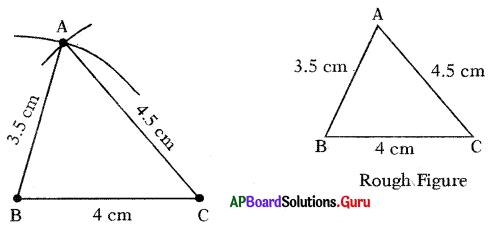
![]()
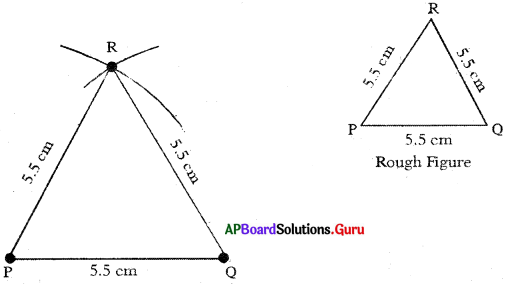
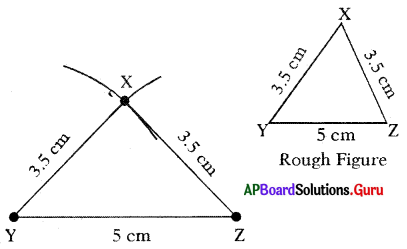
![]()
